Writing the Personal Statement for Pharmacy School: A Checklist
At some point in your life, you’ve likely written a personal statement. Perhaps while applying to your undergraduate program, some of your schools required you to include an essay describing your achievements, yourself, and what you hope to accomplish in your time at their university. Similarly, many pharmacy programs will require you to write a personal statement as well for their application.
This, however, is different. Not only will you want to highlight your relevant accomplishments and address why you want to become a pharmacist to truly stand out . With so many applicants during each cycle, admissions officers use this personal statement to gauge whom they would want to speak with for an in-person interview.
At this phase of the application journey, you've narrowed down the pharmacy schools you’re applying to. Your transcripts are in, letters of recommendations are ready, and it’s time for your pharmacy personal statement. The good news is that unlike undergraduate applications that sometimes have different prompts you must answer for different schools, your one pharmacy school personal statement will be sent to every program through your PharmCAS application. That also leaves an interesting challenge: Even if you have a favorite, you need to consider how you want to approach writing this personal statement as it shouldn’t be tailored toward one specific school.
When it comes to writing a pharmacy school personal statement, the most common pitfall students experience is the lack of effort placed into their writing. While your grades may be exceptional and your letters of recommendations prove that your student-teacher relationships are healthy and you are a pleasure to have in class, having a generic pharmacy personal statement doesn’t differentiate you from other qualified applicants. If all applicants have the first two things covered already, then obviously the personal statement may be the shining piece to the application. For most students, writing this statement will be the toughest part of the application process.
Begin to formulate your narrative. Lay out the structure and the different sections. There’s no specific format that pharmacy schools are looking for, so make this personal statement unique to yourself. As mentioned, the “cookie cutter” approach to this part of the application is where most students stumble. Use your time wisely and start early . Additionally, you can easily find a sample personal statement on various websites to help structure your thoughts. However, keep in mind that these should be used only as samples and that you shouldn’t rely on them to format your own statement.
Each pharmacy school program wants students who demonstrate a tenacity that will help them succeed at their respective programs. One way to approach the writing of your pharmacy school personal statement is from the point of view of the admissions committee. Anyone charged with reading thousands of applications will probably focus on certain questions that signal a level of quality about the rest of the personal statement.
First, what's the reason that this student is choosing pharmacy as their career? Are they doing this for the income or for genuine interest in providing the best care for patients? Does the applicant demonstrate thoughtful understanding of their strengths and weaknesses? Do their ideals align with the mission statement of the school of pharmacy? Each reviewer may concentrate on different questions, but they want to see you feel a personal drive for a career as a pharmacist. Place yourself into the seat of an application reviewer and start to formulate different questions that you’d potentially ask students. Try answering these questions and see how genuine your answers are. How you answer may decide if you want to continue to pursue this pharmacy school path.
One universal method that many writing courses teach you is to always have a strong opening statement. Use this as an opportunity to begin with a personal story relating to why you decided that pharmacy is the right career for you or maybe an inspiring quote that has always resonated with you. Chances are that the reviewer may have already gone through a handful of applications already, so your first few sentences should stand out. You want to be able to make an impression from the beginning while showing an earnest drive to spend a career as a pharmacist.
Once you’ve engaged them effectively, it’s time for the “meat” of the personal statement. What do pharmacy application committees truly want to hear?
They want to learn more about you before meeting in a live interview setting. Tell your own story succinctly but without cutting corners. Briefly describe how you learned to overcome obstacles like that to better yourself and those around you. Sure, you can write about your most relevant academic accomplishments. But go beyond that.
Discuss how certain clubs and organizations have helped you progress through your undergraduate experience and how those organizations may have led you to pursue the path of pharmacy school. Highlight the different leadership positions that you may have held in college that have helped mold you into the leader that you see yourself as today. After setting those up, discuss the skills you’ve acquired to help you in pharmacy school and how they’d make you a better pharmacist in the future. When mentioning your relevant academic studies, avoid repeating pharmacy college admission test (PCAT) scores or that 4.0 GPA that you had achieved. The committee has this information in front of them as they are reading; they don’t need to be reminded.
Talk in detail about your relevant work experiences, such as the research or part-time job in a pharmacy. Discuss how these different work experiences furthered your commitment to the profession. Identify what aspects of the pharmacy setting may have attracted you and what you ultimately have been learning from these experiences. Some students come into this part of the application process without work experience. That’s okay. You can highlight any volunteer work related to healthcare or pharmacy.
Finally - and we can’t stress this enough - keep your writing professional. You’re making an impression on a professional committee and as much as you want to make your statement sound lighthearted, keep in mind that the reviewers’ time is at a premium for reviewing the essays as well as the interviews in the next round. Be succinct, direct, and human.

Remember to keep our advice top of mind:
The goal of your personal statement is to showcase why you would be the most ideal pharmacy student and why your traits/qualities are reflective of a pharmacist.
Be as authentic as possible when detailing why you want to be part of the PharmD program.
GPA and PCAT scores can only get you so far. Your personal statement is a chance for you to stand out in front of the other applicants that apply to the same pharmacy program as you.
Remember, perfecting the personal statement takes time and your admission may depend on how much effort you ultimately put into your writing.
Click here to get matched to a PharmD program that best fits your profile.
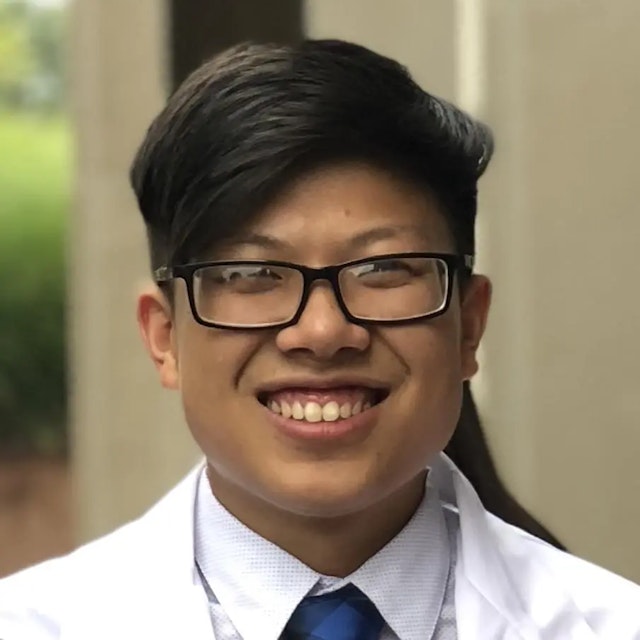
Hong Chen, PharmD
My name is Hong Kui Chen and I am a graduate of The Ohio State University Pharmacy Class of 2022. I am currently working as a clinical research associate at Medpace, Inc, a contract research organization based in Cincinnati, Ohio. My work mainly consists of traveling to various sites around the country and providing protocol training on new clinical trials or monitoring data. While I enjoyed the traditional pharmacy role of working in retail or hospital, I wanted to expand and pursue this non-traditional role to see how clinical trials operate. I have a passion for being able to impact patients in a grand scale and even though I don’t have the 1-on-1 patient interaction, the work that I do can have long lasting contributions to overall patient health.
Opinions and information published by the author here on PharmDDegree.com are of my own and do not necessarily represent the views or opinions of my employer.
Do Not Sell My Info
- Advertise With Us

- Pharmaceutical Technology
- Clinical Pharmacy
- Pharmaceutical Microbiology
- Pharmacology
- Pharmaceutics
- Pharmacy Management
- Pharma Companies
- Pharmaceutical Machines
- Questions and Answers
- PHARMA MARKETPLACE
- Pharma Marketplace
Tips for Writing a Pharmacy School Personal Statement
Like in any other field of education, a pharmacy statement is a way of selling yourself to the admission tutors by showing them why you are a great pharmacy candidate. A personal statement is an opportunity to detail your skills, strengths, and career objectives in pharmacy. A personal pharmacy statement allows you a maximum of 4000 characters. It would be best to discuss why you are interested in pursuing a pharmacy degree in as few words as possible while ensuring you stand out from the crowd of prospective students.
- 1 Why is a personal statement important?
- 2 What makes a good personal statement?
- 3 Common mistakes to avoid
- 4 What to include in your statement
- 5.1 1. Preparation
- 5.2 2. Proper grammar
- 5.3 3. Proper structure
- 5.4 4. Connect with your reader
- 5.5 5. Include only Pharmacy relevant achievements
- 5.6 6. Avoid plagiarism
- 5.7 7. Avoid controversial topics
- 5.8 8. Proofread your work
Why is a personal statement important?
Statistics show that at least 50% of pharmacy school applications get rejected. These applications are not always denied because of poor scores. These students typically have scored just as good as their accepted counterparts. A personal statement is essential because it is what makes or breaks your application. This is because admission tutors are keen to welcome candidates who are genuinely passionate about and dedicated to the profession.
What makes a good personal statement?
An excellent personal statement uses evidence. Support all your claims. It would be best if you remembered that the admission tutors already know you are trying to convince them that you are a suitable match, as are all the contenders. Sure, you can go on and on about how willing you are to learn, but it would be more effective if you backed such claims with real-life examples.
Please use a personal statement writer service to get professional custom help in writing a good pharmacy personal statement. As a matter of fact, CustomWritings is considered to be one of the most reliable services on the market currently.
Common mistakes to avoid
It is important to remember that the perfect pharmacy personal statement does not have to follow a specific format. Remember that the admission tutors will only review your pharmacy statement for 10-30 minutes, no matter how much time you spend on it. This is not to say that you should rush through it but focus on capturing and maintaining the tutors’ interests. The tutors will review your statement from different angles, meaning you cannot afford to leave room for misinterpretation.
Please resist the urge to follow a predetermined formula you acquired online or from your friends, regardless of how they scored on it. You may easily be tempted to borrow ideas from successful pharmacy students, but this will compromise your authenticity. The admissions tutors have likely seen numerous personal statements so do not embarrass yourself by submitting a copied statement. Besides, you want to show how passionate you are about pharmacy, don’t you?
Read Also: How to Become a Chemistry Problem Solver
What to include in your statement
- Pick a specific pharmacy area you are most interested in and explain why you are interested in that area. Show that you are passionate about that subject (it helps if you are passionate about the area you choose to write about).
- Highlight your motivations for studying pharmacy. When did you realize you wanted to pursue pharmacy? Why? Are you able to support this with evidence from your life?
- Describe your hobbies and extracurricular activities (especially if they are related to pharmacy). The goal is to highlight the skills you have gained from these activities and how they will benefit you in your studies as a pharmacist.
- Include any work experience placements in related fields such as nursing or medicine. Talk about what you learned from these experiences.
- Talk about your traits and qualities that you feel make you a good pharmacy student.
- Please demonstrate that you are a good reader by talking about recent related reads and how they have shaped your thinking. Feel free to respectfully share any views and opinions, always remembering to support them with solid evidence.
How to Write a Good Pharmacy School Personal Statement
Below are a few tips to make sure your statement makes your application stand out and increase your chances of getting accepted into your program of choice:
1. Preparation
Preparation is key. Start early so that you do not end up rushing and producing a mediocre statement. Start planning early as you don’t want to be pressed for time.
2. Proper grammar
Use proper grammar and punctuation. Poor grammar makes for a wrong first impression. Polish your basics on grammar and avoid submitting a statement riddled with error.
3. Proper structure
Structure your statement correctly. Ensure the first statement captures your reader’s attention and then has a few supporting paragraphs. You have a tiny window of grabbing your reader’s attention, so use it wisely. Finally, have a conclusion that ties it all together.
4. Connect with your reader
Connect with your reader, even if it means sharing a few personal stories. The goal here is to make sure you communicate who you are. A personal statement is a monologue to the admission committee, and if they can connect with you, they will like you.
Show the admission tutors that you are aware of the challenges that await you and that you are committed regardless. Talk about how rewarding you think this path will be for you, your family, your community, your patients, and the pharmacy practice itself.
5. Include only Pharmacy relevant achievements
If you have lofty achievements outside the pharmaceutical field, do not include them in your statement. Include only pharmacy-related experiences.
6. Avoid plagiarism
Committee members can always see through plagiarized works, so avoid this at all costs. This will only destroy your credibility in the field.
7. Avoid controversial topics
The personal statement is not a discussion ground for questionable topics. Do not alleviate issues that disagree with the overall subject in question.
8. Proofread your work
Sometimes people miss tiny mistakes by not proofreading their work. Have friends and family check your work and act on the comments. Inadequate proofreading can be catastrophic, so ensure you correctly use your language before sending the statement to the admission committee.
As now you are well acquainted with the components of writing an impeccable pharmacy personal statement , you should have no trouble in getting admitted into Pharmacy school. Pharmacy school is about honor and prestige, and you need the best of luck in this noble endeavor.
Chemistry Problem Solver: How to Become One?
Understanding the Various Types of Hepatitis Virus

March 18, 2024

February 18, 2024

February 3, 2024
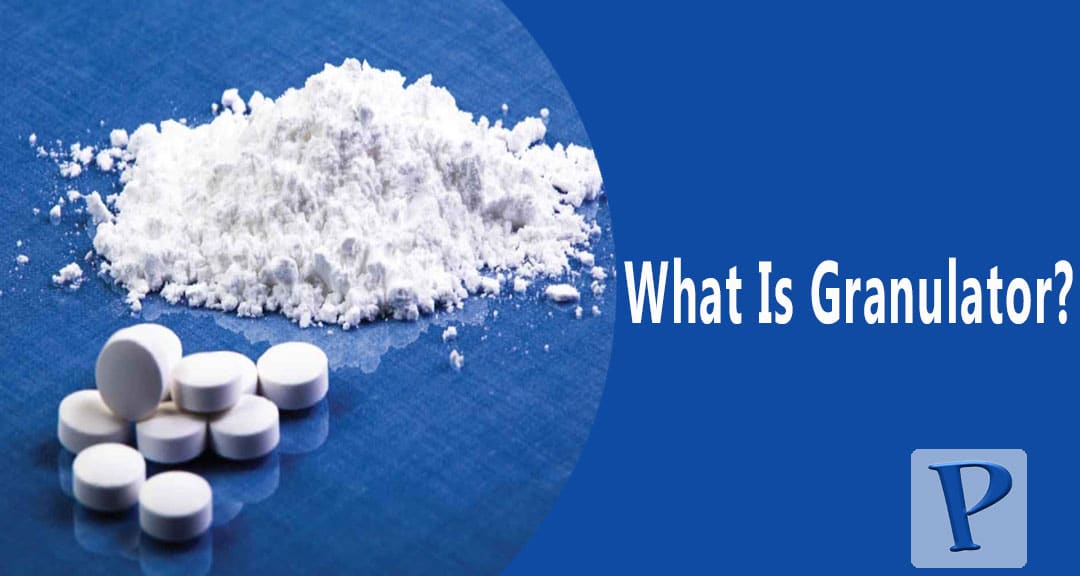
November 10, 2023
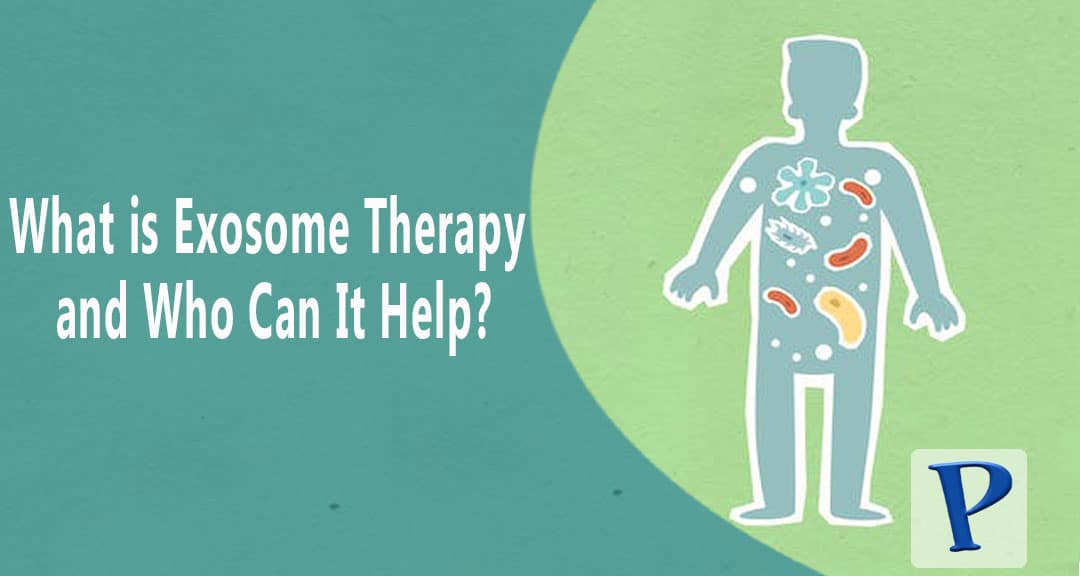
September 26, 2023
Thanks for Sharing the Great Post.
You are welcome. I am happy you found it useful.
I’m very excited to have found out this article, Keep on writing more and more. All Assignments Help
I love dis article
Leave a Reply Cancel reply
Your email address will not be published. Required fields are marked *
- What are the advantages of a tablet?
- Explain the concept of dosage forms and their importance in pharmaceutics
- Tablet Manufacture by Wet Granulation Method
- How to Reconstitute Injectable Powder for Suspension [Step-By-Step Guide]
- Pharmaceutical Plant Layout
- Advantages and Disadvantages of Film Coating
- Top 10 Pharmaceutical Companies in the United States
- 11 Tips on How to Control Crystal Growth in Pharmaceutical Suspensions
- Best Preparation Strategies for Pharmacy Tech Exams
- List of Pharmaceutical Companies in Switzerland
Regulations, Guidelines and Clinical Trials
Important links, submit articles.
- Terms and Conditions
- Privacy Policy

- AI Content Shield
- AI KW Research
- AI Assistant
- SEO Optimizer
- AI KW Clustering
- Customer reviews
- The NLO Revolution
- Press Center
- Help Center
- Content Resources
- Facebook Group
A Quick Guide to Writing Pharmacy School Personal Statement
Table of Contents
When it comes to applying to pharmacy school, your personal statement is one of the most important pieces of your application. It’s your opportunity to stand out from the rest of the applicant pool. So how do you write a personal statement that will make an impression? This article provides valuable tips and a pharmacy school personal statement sample to study and use as inspiration while writing one for yourself.
So read on for everything you need to know about writing a successful pharmacy school personal statement!
What Is a Pharmacy School Personal Statement?
Pharmacy school personal statements are documents that allow pharmacy students to introduce themselves and their reasons for wanting to attend pharmacy school. They can also highlight any unique experiences or qualifications the student has that would make them a good candidate for admission into pharmacy school.
Personal statements are important because they help admission committees get to know potential students beyond just their grades and test scores. Your statement should be well-written, honest, and reflective of who you are as a person.
What Do Colleges Look for in Pharmacy Students?
The skills and qualities that colleges look for in pharmacy students typically include the following:
Strong Analytical and Problem-Solving Skills
Pharmacy is a science-based profession, so the ability to think critically and solve complex problems is essential.
Solid Math Skills
A foundational knowledge of math is necessary for understanding the concepts behind pharmaceutical calculations.
Excellent Communication Skills
The pharmacist’s role involves communicating with patients, other healthcare professionals, and pharmacists at different pharmacies. Good communication abilities are essential for success in this field.
Passion for Helping Others Improve Their Health
Pharmacists play a significant part in improving patient care. So it’s important that potential students have a sincere desire to help others achieve better health outcomes.
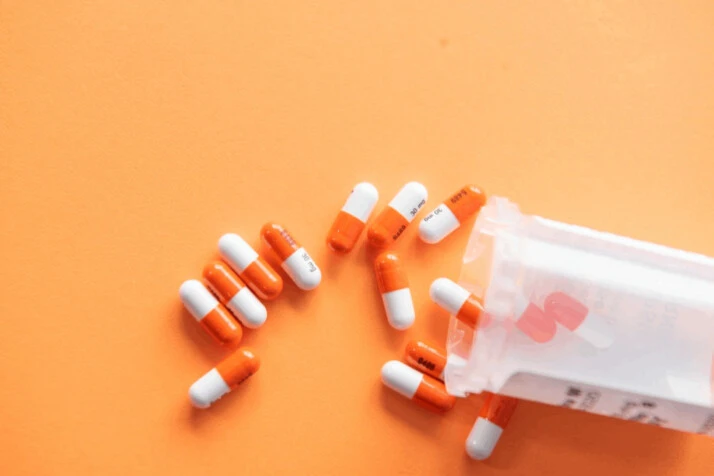
Tips to Write a Pharmacy School Personal Statement
Here are some practical tips to keep in mind when writing your pharmacy school personal statement :
- Start early: Give yourself plenty of time to write a strong personal statement. This isn’t something that can be rushed, so start thinking about it well before the application deadline.
- Be specific: Don’t just say that you want to become a pharmacist because you like helping people. Give concrete examples of how you’ve helped others in the past and what motivated you to pursue this career path.
- Sell yourself: Emphasize your strengths and why you believe pharmacy is the right fit for you. Think about what sets you apart from other candidates.
- Show, don’t tell: Rather than simply stating your goals or qualifications, use anecdotes or stories to illustrate them. This will make your essay more engaging and unique.
Pharmacy School Personal Statement Sample
Use the following pharmacy school personal statement sample as inspiration to craft your own:
Ever since I was a little girl, I loved going to the pharmacy with my mom. Watching her talk to the pharmacist always fascinated me and sparked my interest in pursuing a career in pharmacy. As I grew older, I began to realize that pharmacies are more than just places where you can buy medication. They play a crucial role in our healthcare system by ensuring that medications are dispensed correctly and safely. This is why I am so passionate about becoming a pharmacist myself. I want to help contribute to making sure that people have access to quality medications when they need them most.
While attending college, I had the opportunity to work as an intern at several different pharmacies. This gave me invaluable experience working directly with patients and pharmacists alike. Through these experiences, I developed a strong love for chemistry and pharmacology. This has only solidified my desire to pursue a degree in Pharmacy once I complete my undergraduate studies.
Ultimately, my goal is to become licensed as PharmD and work within a community or hospital setting. I want to dispense medication prescribed by physicians optimally and safely to facilitate patients’ healing process. Providing high-quality care combined with warmth, compassion, and individualized service excellence will make a difference in the lives of those we encounter every day.
The purpose of a personal statement is to give the admissions committee a preview of what you have to offer as a prospective student . It allows a recruiter to form a personal opinion of you.
This article provides valuable tips with a strong sample to help you craft a pharmacy personal statement and present yourself as a qualified applicant.

Abir Ghenaiet
Abir is a data analyst and researcher. Among her interests are artificial intelligence, machine learning, and natural language processing. As a humanitarian and educator, she actively supports women in tech and promotes diversity.
Explore All Write Personal Statement Articles
How to draft meaningful length of law school personal statement.
Are you confused on how to write a law school personal statement? One of the essential elements of your application…
- Write Personal Statement
Effective History and International Relations Personal Statement to Try
Are you considering studying history and international relations? Or you may be curious about what a degree in this field…
Guide to Quality Global Management Personal Statement
Are you applying for a global management program and want to stand out from the crowd? A well-written personal statement…
How to Draft Better Examples of Personal Statements for Residency
Achieving a residency can be a massive accomplishment for any aspiring medical professional. To secure your spot in one of…
Tips for Drafting a Free Example of Personal History Statement
A personal history statement can be crucial to many applications, from university admissions to job search processes. This blog will…
Writing Compelling Dietetic Internship Personal Statement
Applying for a dietetic internship is a rigorous process and requires submitting a personal statement, which is an essential part…

- Online Course
Writing a Personal Statement for Pharmacy School (10 Tips)
They say, “The art of medicine consists of amusing the patient while nature cures the disease.”
The medicine business will never run out of demand and thus, being a pharmacist is undoubtedly a promising career. If you choose to be a pharmacist and want to get into a good pharmacy school, you need to write a personal statement. It is usually a part of the college’s admission requirements. Not sure how to write a personal statement for pharmacy school? Hey, I’m here to help.
Why is a personal statement important?
Statistics have revealed that the rejection rate of pharmacy schools is as high as 50%. No, they’re not denied because of lower grades. These students’ scores are as good as the other applicants. The differentiating factor is none other than the personal statement. The admission committee welcomes dedicated students who are passionate about the profession. An outstanding personal statement may give that lasting good impression that they are looking for. Now, let me share a few tips to get you started.
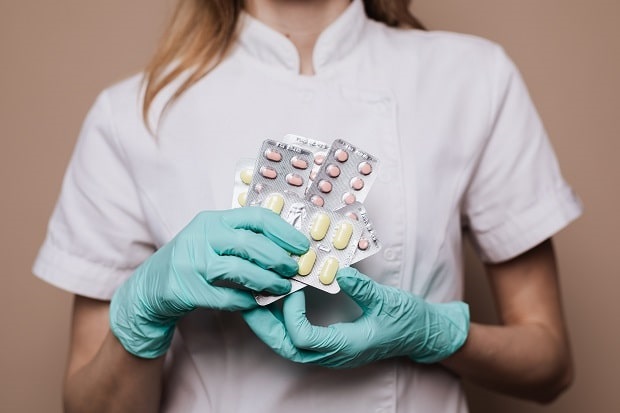
10 Tips on Writing a Good Personal Statement for Pharmacy School:
1. start early.
An amazing pharmacy school personal statement needs a bit of preparation . You do not want to rush it and create a mediocre one, do you? Once you’ve decided which schools you want to apply to, take the time and start planning early about what to write . I’d say it takes at least a month of serious thoughts and several drafts before you can pen down a good one!
2. Introduce Yourself Properly
Start the personal statement with a catchy line to grab the reader’s attention . Once you’ve hooked them to read further, switch to describing yourself next. You must connect with the reader, even if it requires sharing a few personal anecdotes. The aim is to communicate who you are as a person. Think of it as a written monologue you submit to the admission committee. The more the readers connect with you on a personal level, the better the chances they’ll like you and eventually accept you.

Always be genuine when introducing yourself. Let your real personality shine.
3. Have a Proper Structure and Organize Your Essay Well
Ensure your personal statement essay has an appropriate structure. As I mentioned above, you must start with a catchy sentence to grab the recipient’s attention. This will keep them intrigued to read more. Once you have a proper “first statement” follow it up with smaller paragraphs. Try to keep your essay theme-based. Talk about every topic distinctively and move from one topic to another seamlessly. Also, you must have a strong conclusion that would summarize the entire personal statement. Try to stay away from controversial or highly debatable topics and make your essay as reader-friendly as possible.
4. Show Your Enthusiasm and Commitment
Unless you’re passionate about pursuing a career that involves legally preparing and dispensing drugs, you should not apply for admission to a pharmacy school. Your lack of interest would reflect in your essay if you are just applying for the sake of getting into college. Trust me, pharmacy school and the subsequent post-graduate courses you’d attend are no joke! You do not want to be unhappy in the future for choosing this profession halfheartedly. So, once you’re committed to writing your statement, show your enthusiasm through your words. Don’t overdo it, though. There’s a long road of struggle ahead and the admission committee must understand that you’re committed to winning the battle!

Your enthusiasm and commitment to the course must be reflected in your statement.
5. Do Not Add Fillers
Fillers are nothing but including unnecessary information in your writing. Simply put, it is “beating around the bush”. Please do not do it. In any form of writing, including fluff words is inessential, and it is uncalled for. Research pharmacy topics and trends and come prepared to write a personal statement . Stick to the point and do not add irrelevant content just to meet a certain word limit or make your essay seem longer. The admission committee will most likely lose interest in your essay if you do so. Put your focus on writing clear and concise content.
6. Include Academic Successes that are Pharmacy-related
Talking about achievements unrelated to the course will not help you earn brownie points. Why would winning an art contest or achieving top grades in mythology interest the admission committee? On the flip side, are there any distinctive academic successes that connect your aptitude for science or your passion for enrolling in a pharmacy school ? Be sure to include that. Try to show how you are suited for this profession. However, do not force-fit anything by talking about unrelated achievements.

If you excel in science subjects in high school, particularly those that involve laboratory experiments, include this in your statement.
7. Ensure the Grammar and Punctuation are error-free
Always proofread your work. Even if that means reading it 5 times in a row. There is always room for improvement, you know. Ask for feedback and work on the content and structure of your statement if needed. You could leverage online writing add-ons or apps such as Grammarly or ProWritingAid to check your grammar and punctuation. The admission committee can spot even tiny mistakes easily, and you wouldn’t want to make one, right? Here’s a pro tip. Ask your English professor or teacher to read through your essay once. Who can check your work better than them? Incorporate changes as necessary.
8. Say No to Plagiarism
Plagiarism or copying others’ work is your expressway toward rejection. Not only does it affect your credibility in the field, but plagiarism is also a punishable offense . There are multiple apps and tools to detect plagiarized content, so do not even think of it. Yes, you can research and look through similar examples for ideas on the content and structure. However, always write your pharmacy school personal statement in an original format and your own words. If you must copy an idea from some published sources, make sure that you paraphrase the sentences and paragraphs well.

9. Get a Second Opinion
I mentioned earlier about connecting with your English professor or asking others for feedback on your content. I want to put it out here once again, that you must connect with your friends or family who may or may not have pharma experience, to check your work. Their unique perspective can offer guidance to help you improve your content. Take any constructive feedback with a positive attitude and work on bettering your final copy.
10. Display Confidence
It requires immense sincerity and self-reflection to write a pharmacy school personal statement. For your readers, to relate better to your essay, you must also consider their point of view. Your statement should exude confidence. Include selling points and market your brand by providing pieces of evidence or cases. For example, if you want to mention that you have exemplary communication skills, tell them how and authenticate your content.
Final Thoughts
A pharmacist’s job requires hard work, dedication, and utmost passion. If this is your calling, jump at the opportunity of applying to top pharma schools. Keep these tips in mind while writing your pharmacy school personal statement. Did I miss anything above that may have worked for you? Next up, you may want to explore a guide to the best marketable skills you can learn today .

Digital marketing course: Join my full AI Marketing course, with over 6h and 30 minutes of video lessons and 5 bonuses and learn the skills necessary to thrive as a marketer in the digital era.

Rafal Reyzer
Hey there, welcome to my blog! I'm a full-time entrepreneur building two companies, a digital marketer, and a content creator with 10+ years of experience. I started RafalReyzer.com to provide you with great tools and strategies you can use to become a proficient digital marketer and achieve freedom through online creativity. My site is a one-stop shop for digital marketers, and content enthusiasts who want to be independent, earn more money, and create beautiful things. Explore my journey here , and don't miss out on my AI Marketing Mastery online course.
Our Services
College Admissions Counseling
UK University Admissions Counseling
EU University Admissions Counseling
College Athletic Recruitment
Crimson Rise: College Prep for Middle Schoolers
Indigo Research: Online Research Opportunities for High Schoolers
Delta Institute: Work Experience Programs For High Schoolers
Graduate School Admissions Counseling
Private Boarding & Day School Admissions
Online Tutoring
Essay Review
Financial Aid & Merit Scholarships
Our Leaders and Counselors
Our Student Success
Crimson Student Alumni
Our Reviews
Our Scholarships
Careers at Crimson
University Profiles
US College Admissions Calculator
GPA Calculator
Practice Standardized Tests
SAT Practice Test
ACT Practice Tests
Personal Essay Topic Generator
eBooks and Infographics
Crimson YouTube Channel
Summer Apply - Best Summer Programs
Top of the Class Podcast
ACCEPTED! Book by Jamie Beaton
Crimson Global Academy
+1 (646) 419-3178
Go back to all articles
Navigating the Path to Pharmacy School: Your Ultimate Guide
/f/64062/1035x580/ef04633c0a/students-studying-medicine-medview.png)
Ready to embark on a thrilling journey, one filled with the mysteries of molecules, the challenges of chemistry, and the allure of anatomy? Welcome aboard the express train to Pharmacy School! This isn't your average career path – it's a rollercoaster ride through rigorous academics, demanding practicals, and rewarding patient interactions. But fear not! We've got the ultimate guide to help you navigate the twists and turns, uphill climbs and exhilarating descents. So buckle up, future pharmacists, our adventure begins now!
Picture this: a nation of over 300 million people, each with a unique set of health needs. Now imagine the superheroes who step up to meet these needs, armed not with capes but with vials and prescriptions - our gallant pharmacy professionals! Welcome to the bustling and ever-relevant world of pharmacy schools in the US, the training grounds for these healthcare heroes.
Pharmacy professionals are like the unsung maestros of healthcare, orchestrating a symphony of patient care that often goes unnoticed. They are the human bridge between medical jargon and everyday language, between doctors and patients, and between illness and recovery. They are the guardians of medication, ensuring the right drug reaches the right person at the right time.
So, are you ready to join this noble profession? Our guide will take you on a whirlwind tour of pharmacy schools, preparing you for a career that truly makes a difference. Strap in, future pharmacists; we're about to lift off!
Why Pursue Pharmacy School?
Why would one choose to dive headfirst into the whirlpool of pharmaceutical studies? Why would someone willingly immerse themselves in a world of molecules, medicines, and medical terms?
You're not just standing behind a counter, dispensing pills. You're a healthcare chameleon , capable of adapting to various roles. One day, you might be a community pharmacist, lending an empathetic ear to anxious patients. Next, you could be a clinical pharmacist, working side by side with doctors to optimize patient treatment. Or perhaps you fancy yourself as a pharmaceutical researcher, on a quest to discover groundbreaking drugs. The pharmacy field is a treasure trove of opportunities, each more exciting than the last.
But the allure of pharmacy doesn't stop there. It's a profession that offers robust job security - after all, as long as people need healthcare, they'll need pharmacists. Plus, the salaries are nothing to sneeze at. With competitive pay scales that often surpass six figures, it's a career that rewards your intellectual and financial hard work and dedication .
Yet, perhaps the most compelling argument for pursuing pharmacy school is the chance to make a tangible difference in people's lives. As a pharmacist, you're a key player in the healthcare team, managing medications and ensuring patients understand their treatments. You're the safety net, catching potential drug interactions and the compass, guiding patients through the maze of medication management. It's a role that's as rewarding as it is crucial.
So, why pharmacy school? It's a path that leads to a career as diverse as it is meaningful, as secure as it is lucrative, and as fulfilling as it is important. It's not just about dispensing drugs; it's about dispensing care, knowledge, and hope.

Prerequisites and Admission Requirements
Undergraduate coursework.
Embarking on the journey to pharmacy school is akin to training for a marathon – you can't just lace up your shoes and run 26.2 miles. There's a regimen to follow, a series of trials to complete, beginning with undergraduate coursework. This is where you lay the foundation, brick by academic brick, building your knowledge in key areas like biology , chemistry , physics , and mathematics . Picture these subjects as the four pillars, supporting the vast edifice of pharmaceutical studies you're about to construct. Whether it's understanding the basic building blocks of life in biology, unraveling the mysteries of matter in chemistry , dissecting the laws of nature in physics , or deciphering patterns and problems in mathematics – each course sharpens your intellectual toolkit, preparing you for the rigors of pharmacy school.
Bachelor’s degree
While a bachelor’s not always required, it's often preferred, and for good reason. A bachelor's degree is more than just a piece of paper; it's a testament to your academic resilience , intellectual curiosity, and commitment to education . It represents years spent delving into diverse subjects, honing your critical thinking skills, and broadening your understanding of the world . Whether your degree is in biology, chemistry, or even English literature, it provides a well-rounded foundation that pharmacy schools value. Some institutions offer direct '0-6' programs, where you transition from high school into a six-year program culminating in a Doctor of Pharmacy degree.
Pharmacy College Admission Test (PCAT)
The PCAT is a comprehensive and challenging standardized test that measures your grasp of essential sciences like biology and chemistry, while also assessing your quantitative reasoning and verbal abilities. It's an opportunity to demonstrate your readiness for the rigorous pharmacy school curriculum. But remember, crossing this bridge doesn't solely depend on how much you know, but also on how well you can apply what you know.
Letters of recommendation
Letters of recommendation are like the golden keys that can unlock the doors to pharmacy school. They're not just formalities or mere words on a page; they're powerful testimonials of your character , work ethic , and potential . Whether they come from professors who've witnessed your academic prowess, employers who've observed your dedication, or licensed pharmacists who've seen your passion for the field in action, these letters carry weight. They provide a glimpse of who you are beyond your grades and test scores. They offer insight into your problem-solving skills, your ability to work in a team, and your commitment to the profession. So, when it comes to requesting these letters, choose your referees wisely. Pick those who know you well and can speak sincerely about your strengths and suitability for pharmacy school.
Personal statement
Your personal statement is your spotlight moment on the stage of your pharmacy school application. It's your chance to step out from the shadows of grades and test scores, and into the light of your unique story. This is where you reveal the 'why' behind your journey - why pharmacy? Why this school? What experiences have shaped you, and how will they influence you as a pharmacist? Your personal statement is an opportunity to showcase your passion , determination , and vision for the future . It's your narrative, told in your voice, resonating with your hopes and dreams.

Factors to Consider when Choosing the Right Pharmacy School
When selecting the right pharmacy school, reputation is like the school's signature. It's an indicator of quality , a reflection of standards , and a marker of the school's track record in producing competent pharmacists. The reputation of a pharmacy school isn't just about the name or the prestige; it's about the quality of education , the caliber of faculty, and the success rate of its graduates . It's about how well the school prepares you for the real world of pharmacy, equipping you with the knowledge and skills employers value. But remember, reputation should not overshadow personal fit. A school might have a stellar reputation, but if its values, culture, or curriculum do not align with yours, it might not be the right place for you. So, when considering the reputation of a pharmacy school, think of it as one piece of the puzzle, an important piece, but not the only one.
Specific programs offered
Different schools might offer different specializations, dual-degree options , or innovative teaching methods that could align perfectly with your career goals . Maybe you're interested in pharmaceutical research, and a school offers a robust research program . Perhaps you're drawn to community health, and there's a school with a strong emphasis on public service. Or maybe you're interested in business, and a school offers a dual PharmD/MBA degree. These programs can enrich your learning experience and open doors for diverse career paths.
Location of the school
Do you thrive in the hustle and bustle of a big city, with access to diverse populations and healthcare settings? Or do you prefer the close-knit community of a smaller town, with a slower pace and tight-knit campus community? Beyond personal preferences, consider practical aspects like cost of living, proximity to family and friends, and potential networking opportunities. The school's location can also impact your post-graduation clinical rotations and job prospects. Remember, this place will be your home, study spot, and playground for the next few years.
Accreditation
Accreditation in the context of choosing a pharmacy school is like a quality assurance stamp. It's a guarantee that the school meets certain standards set by a reputable accrediting body. This means the curriculum is robust , the faculty is qualified , and the school has the necessary resources to provide a high-quality education. But it's more than just a seal of approval. Choosing an accredited school ensures employers and professional bodies recognize your degree. It's also often a prerequisite for licensing exams and certifications. So, accreditation is not just a bureaucratic box to tick off; it's a key factor in ensuring that your investment in education pays off in the long run.
Imagine the curriculum of a pharmacy school as the roadmap to your educational journey. It outlines what courses you'll take , the skills you're expected to develop , and the knowledge you'll gain along the way. Some schools might offer a curriculum that leans heavily towards hands-on clinical experience, while others might emphasize theoretical knowledge or research capabilities. You may find curriculums incorporating cutting-edge technology or sticking to more traditional modes of instruction. This roadmap will guide your learning for the next few years, shaping your expertise and preparing you for your future career.

Coursework Expectations
Typical coursework.
Typical coursework in pharmacy school is designed to provide a solid foundation in health sciences while focusing on the specific knowledge and skills needed in pharmacy practice. You can expect to delve into subjects like pharmacology , medicinal chemistry , biostatistics , and pharmacy law . Additionally, there will be ample focus on patient care including courses on drug interactions , therapeutic agents , and patient counseling .
Recommended Courses for Pharmacy School
Hands-on training.
Whether it's administering medication , interacting with patients , or dealing with potential drug interactions , hands-on training provides the platform to apply and refine your skills. It's not just about the technical aspects, but also about developing essential soft skills like communication, empathy, and problem-solving. It gives you the freedom to make mistakes and learn from them in a controlled setting.
How Long is Pharmacy School?
Typically, pharmacy school takes four years to complete after obtaining your undergraduate degree. This time frame includes a mix of classroom instruction , laboratory work , and supervised clinical experience . However, some ambitious students opt for accelerated programs that can be completed in three years, while others may choose a part-time route, extending their education over a longer period. Additionally, many pharmacists decide to further specialize in a particular area of pharmacy which requires a residency of one to two years post-graduation. So, while the standard answer is four years, the actual length of your pharmacy school journey can vary based on your personal goals and career aspirations.
Examinations and Licensure
Licensing requirements.
Becoming a licensed pharmacist requires more than just completing pharmacy school. After earning your Doctor of Pharmacy (Pharm.D.) degree , you must pass two examinations to get your license. The first is the North American Pharmacist Licensure Examination (NAPLEX) , which tests your knowledge of pharmacy practice. The second is the Multistate Pharmacy Jurisprudence Examination (MPJE ) or a state-specific jurisprudence exam focusing on pharmacy law. Remember, licensing requirements can vary from state to state, so it's important to check with your state's pharmacy board for the specific requirements.
The North American Pharmacist Licensure Examination (NAPLEX) is a crucial step for aspiring pharmacists seeking licensure in the United States. This comprehensive exam, administered by the National Association of Boards of Pharmacy (NABP) , tests your knowledge and skills in areas such as ensuring safe and effective pharmacotherapy and health outcomes, and preparing and distributing medications. To sit for the NAPLEX, candidates must have graduated from an accredited Doctor of Pharmacy (Pharm.D.) program.
The Multistate Pharmacy Jurisprudence Examination (MPJE) is another essential step on the path to becoming a licensed pharmacist in the United States. This exam, also administered by the National Association of Boards of Pharmacy (NABP), is designed to assess your understanding of pharmacy law. It's tailored to the laws and regulations of each state , providing a state-specific examination. To qualify for the MPJE, you must have graduated from an accredited Doctor of Pharmacy (Pharm.D.) program. Some states may also require a specific amount of internship hours before taking the MPJE.
Career Outlook and Opportunities
Pharmacy career outlook and opportunities, student resources and support, american pharmacists association.
The American Pharmacists Association (APhA) offers a wealth of resources to support pharmacy students. They provide opportunities for networking, leadership development , and professional growth. APhA encourages students to engage in advocacy efforts for the profession and offers access to a wide range of educational resources. They also host an annual meeting and exposition where students can learn about the latest industry trends, meet potential employers, and connect with other professionals.
- National Community Pharmacists Association
The National Community Pharmacists Association (NCPA) offers substantial support to pharmacy students. It provides opportunities for students to network with experienced community pharmacists and learn about the realities of running a pharmacy business . The NCPA also offers scholarships, competitive events, and a student chapter program that allows students to gain leadership experience and engage in community service.
American Society of Health-System Pharmacists
The American Society of Health-System Pharmacists (ASHP) offers a variety of resources to assist pharmacy students. It provides access to educational materials, research opportunities , and networking events. ASHP also organizes residency programs for students interested in pursuing a career in health-system pharmacy. Additionally, it advocates for the role of pharmacists in healthcare delivery, helping to shape the future.
More resources
- American College of Clinical Pharmacy
- Academy of Managed Care Pharmacy
- American Association of Pharmaceutical Scientists
- Pharmaceutical Research and Manufacturers of America
- International Pharmaceutical Federation
- American Society of Consultant Pharmacists

Scholarship Opportunities
The american pharmacists association (apha) foundation scholarship program.
The APhA Foundation Student Scholarship Program is a distinctive effort that recognizes and supports students who are diligently pursuing a full-time pharmacy curriculum while also making significant contributions to their school's APhA-ASP chapter, thereby influencing the future direction of the profession. Similarly, the APhA Auxiliary/APhA Foundation Student Pharmacist Scholarship Program echoes this sentiment by rewarding those full-time pharmacy students who keep an active role in their APhA-ASP Chapter and work towards shaping their profession's future. This gesture elevates the total number of scholarships to ten , each valued at $1,000 .
Tylenol Future Care Scholarship
The Tylenol Future Care Scholarships offer substantial financial support, in the form of either $5,000 or $10,000 awards , to undergraduate and graduate students committed to pursuing a career in healthcare. This initiative is designed to ease the financial commitments associated with their education, allowing them to concentrate on their academic progress and future career goals.
Express Scripts Scholarship
The Express Scripts Scholars Program is an exceptional initiative that bestows up to four outstanding students, currently enrolled in dual degree programs , with scholarships valued at $10,000 each . This program is a testament to the value Express Scripts places on education and the development of future leaders in the healthcare industry. It's designed to significantly ease the financial burden of tuition , allowing students to focus more on their academic and professional growth.
CVS Health Minority Scholarship for Pharmacy Students
The CVS Health Minority Scholarship for Pharmacy Students is a notable initiative to bolster five exceptional students from underrepresented minority (URM) groups . The selection criteria for the recipients revolve around their proven leadership abilities, academic excellence, and unwavering commitment to propelling the pharmacy profession forward and improving patient care. Each scholar who is chosen will receive a single financial grant of $8,000 , designed to help them further their education in the field of pharmacy.
What Makes Crimson Different
Deciding if Pharmacy School is Right for You
Remember, choosing a career path is a personal decision, and it's okay to take your time to ensure it aligns with your interests, strengths, and long-term goals. If you decide pharmacy school is the right choice, numerous resources and support systems are available to help you succeed in your journey.
The decision to attend pharmacy school is a profound one. Take your time, gather all the necessary information, and listen to your instincts. Your career should align with your interests , values , and long-term goals . If you choose to take this path, know that the world of pharmacy can offer a fulfilling and impactful career.
Key Resources & Further Reading
- Join our free webinars on US university applications
- Free eBooks and guides to help with the college application process
- Best Schools for Pharmacy
- The Best Healthcare Degrees
More Articles
Dartmouth college's acceptance results for the class of 2028.
/f/64062/800x450/0d1055876b/dartmouth-blogs.jpg)
Columbia Admits 3.85% Of Applicants To The Class of 2028
/f/64062/800x450/7a4512310a/columbia-blogs.jpg)
Brown University's Acceptance Results for the Class of 2028
/f/64062/800x450/603432bdfb/brown-blogs.jpg)
Start Your Journey To A Top University Today!
Crimson students are up to 7x more likely to gain admission into their dream university. book a free consultation to learn more about how we can help you.
ESLDIRECT.COM
ESL Resources for Job Hunters, English Learners, Adult Learners and Tutors
Pharmacy Personal Statement Examples
In this article, we discuss pharmacy personal statement examples and how to write a strong statement for pharmacy school.
Find out how a chemistry set and a mom who was a nurse put one candidate on the path to becoming a pharmacist, and how another candidate learned about patient advocacy in rural Cameroon. We’ll also find out how a potential international student plans to contribute to the community in the USA.
The pharmacy personal statement is one of the most important parts of your application. It’s your chance to show who you are as a person and why you want to study pharmacy.
Your personal statement should be well-written, honest, and specific to you as an individual. To help you get started, we’ve put together some pharmacy personal statement examples below.
Table of Contents
What is a pharmacy personal statement, how to write a strong personal statement for pharmacy school, pharmacy personal statement example 1, pharmacy personal statement example 2, pharmacy personal statement example 3, faq (frequently asked questions), more personal statement tutorials.
It’s a short personal essay written about yourself that is used to help graduate schools decide if you would make a good candidate for their programme.
It explains why you want to pursue pharmacology, any awards or achievements you have received, any relevant work or internship experience, and attributes that make you a good candidate, such as excellent people skills, strong attention to detail, and strong organisational skills.
It can also provide an opportunity to showcase qualities that can’t be easily articulated in words, such as empathy, leadership, and motivation. Ultimately, it can be the deciding factor in your acceptance into a pharmacy programme.
Step 1: Explain your USP (unique selling point)
When writing a personal statement for pharmacy school, it is important to determine your approach – what do you need them to know? What is your USP?
You should consider your motivation for pursuing pharmacy as a career, the experiences that have prepared you for pharmacy school, your personal qualities that make you a strong candidate, and how you fit with the pharmacy school you are applying to.
By reflecting on these factors, you can develop a clear and compelling personal statement that highlights your strengths, experiences, and passion for pharmacy.
As an international student, I am committed to bringing a unique perspective to the classroom and contributing to the cultural diversity of the pharmacy program. I believe that my background and experiences will enable me to connect with patients and colleagues from different cultures and build strong relationships based on mutual respect and understanding. I particularly look forward to volunteering with Spanish speakers in the local community during my time at pharmacy school.
Step 2: Read and reread the institution’s instructions
When writing a pharmacy personal statement, it is important to carefully read and reread the instructions provided by the institution to ensure that you meet all the requirements and guidelines.
Start by reading the instructions thoroughly, taking notes on key points, highlighting important details and asking for clarification if needed.
Make sure to pay attention to what is to be included in your personal statement (for example a key question) and if there is a word limit.
Step 3: Consider getting help from an expert
- Identify potential experts. You can do this by reaching out to your academic advisor, contacting your local pharmacy association, or searching online.
- Reach out to them respectfully
- Provide them with the necessary information such as your academic history, work experience, and goals for pursuing pharmacy.
- Listen to their feedback carefully
- Express your gratitude for their time and expertise.
Remember to be respectful of their time and follow up in a timely manner.
Step 4: Write your personal statement
- Begin by summarising your suitability for the role. Make sure to write from the first-person viewpoint.
- Outline your qualifications and experience, followed by your relevant skills. Be sure to emphasize your enthusiasm for the field of pharmacy and the role you are applying for.
- Keep your personal statement brief and include details relevant to the role.
- Be open and honest in your writing. Being honest in your personal statement will help to prevent any exaggeration or incorrect information.
- Talk about how you solved a problem, really connected with a patient or learned something important relating to pharmacy studies.
- During a placement in Cameroon, I learned to ask the obvious and not so obvious questions. Why were several HIV patients from one village suddenly presenting with stomach ulcers? It turned out that some villagers only ate once a day and without support, could not follow the instructions to take medications twice a day with food. A local NGO helped with training on nutritious plants that were safe to eat, in order to take the second dose of medication. I realised that I want to be the type of pharmacist that goes the extra mile to understand the everyday healthcare challenges in the lives of her patients, and support them where needed.
Step 5: Determine your target audience and message
To determine your target audience and message for your pharmacy personal statement:
- Research the pharmacy program: Learn as much as you can about the pharmacy program you are applying to, including its mission statement, values, and requirements. This will help you to understand what the program is looking for in its applicants.
- Identify the target audience: Consider who will be reading your personal statement, such as admissions officers or faculty members. Think about what they are looking for in an applicant and what they might be interested in hearing from you.
- Consider your message: Think about what you want to convey in your personal statement, such as your passion for pharmacy, your experiences that have prepared you for pharmacy school, and your goals for your pharmacy career. Make sure that your message aligns with the values and mission of the pharmacy program you are applying to.
- Tailor your message to the audience: what are you most interested in learning about? For this candidate, it’s the way in which pharmacists can use new technology.
In particular, I am interested in exploring the ways in which technology can be leveraged to improve patient outcomes and streamline healthcare delivery. During the recent pandemic, apps such as HealthPass made it much safer for more vulnerable patients to participate in daily life. As the healthcare landscape continues to shift towards a more patient-centered, value-based model, I believe that pharmacists must be at the forefront of innovation and change.
Step 6: Keep your personal statement concise and clear
Make sure that each point is concise. Paraphrase and condense the content where possible. Make sure that your final statement does not exceed one page.
The order of your paragraphs must make sense. Make sure your points flow logically and that there is a smooth transition from one point to the next.
Step 7: Share your personal statement with a trusted reviewer
Have an expert review your personal statement. Ask someone you trust to read over your statement and provide feedback on the grammar, structure, and content.
Make any necessary changes. Based on the feedback you receive, adjust your statement to make it stronger.
As a dedicated and passionate student of pharmacy, I am committed to making a difference in the lives of others through my work. I believe that pharmacists have a unique opportunity to improve the health and well-being of patients, and I am eager to contribute to this important field.
My interest in pharmacy began at a young age when I saw first-hand the impact that medications can have on a person’s quality of life. I witnessed my grandmother struggle with a chronic illness, and I was inspired by the role that her pharmacist played in helping to manage her condition. This experience motivated me to pursue a career in pharmacy, and I have been working diligently towards this goal ever since.
Throughout my academic career, I have taken a rigorous course load that has prepared me well for the challenges of pharmacy school. I have excelled in courses such as organic chemistry, biochemistry, and pharmacology, and I have gained practical experience through internships and volunteer work. I am confident that my academic background has prepared me well for the challenging curriculum of pharmacy school, and I am excited to continue my education in this field. In addition to my advocacy experience and academic accomplishments, I possess a number of personal qualities that I believe make me a strong candidate for pharmacy school. I am detail-oriented and meticulous in my work, and I am committed to providing the highest level of care to patients. I am also an excellent communicator, and I believe that effective communication is essential to building strong relationships with patients and healthcare providers.
During a placement in Cameroon, I learned to ask the obvious and not so obvious questions. Why were several HIV patients from one village suddenly presenting with stomach ulcers? It turned out that some villagers only ate once a day and without support, could not follow the instructions to take medications twice a day with food. A local NGO helped with training on nutritious plants that were safe to eat, in order to take the second dose of medication. I realised that I want to be the type of pharmacist that goes the extra mile to understand the everyday healthcare challenges in the lives of her patients and support them where needed.
Ultimately, my goal as a pharmacist is to improve the health and well-being of patients through compassionate care and innovative solutions. I am committed to lifelong learning and professional development as a pharmacy professional, and I am excited to contribute to the dynamic and constantly evolving field of pharmacy. Thank you for considering my application.
As a very young child playing with a $10 chemistry set, I was sure that if I tried hard enough I could mix up a medicine that could save all the sick people in the hospital where my mother worked as a nurse! As a dedicated and motivated student of pharmacy, I am thrilled to have the opportunity to pursue an advanced degree in this exciting and constantly evolving field. Throughout my academic career, I have been driven by a passion for helping others and a deep curiosity about the science of medicine.
I believe that pharmacy is uniquely positioned at the intersection of science and patient care, and I am excited to explore the many ways in which pharmacists can make a difference in the lives of patients. From a young age, I was fascinated by the stories of patients my mother would tell, explaining how medicines had helped them to get better. I realised that as researchers work on developing new drugs and therapies to provide education and counselling to patients, pharmacists play a critical role in improving healthcare outcomes and promoting wellness.
In particular, I am interested in exploring the ways in which technology can be leveraged to improve patient outcomes and streamline healthcare delivery. During the recent pandemic, apps such as HealthPass made it much safer for more vulnerable patients to participate in daily life. As the healthcare landscape continues to shift towards a more patient-centred, value-based model, I believe that pharmacists must be at the forefront of innovation and change.
In pursuing an advanced degree in pharmacy, I am excited to collaborate with other healthcare professionals and experts in the field to explore new solutions and approaches. I am eager to learn from experienced professionals, conduct research, and apply my knowledge and skills to real-world challenges to make a meaningful impact on the health and well-being of patients and the ongoing evolution and growth of the field. I am so excited to embark on this exciting new chapter in my academic and professional journey.
As an international student, I am excited to have the opportunity to pursue a degree in pharmacy in the USA. I am drawn to the USA’s reputation for excellence in healthcare and its innovative approach to pharmacy education.
My passion for pharmacy began in my home country, where the numbers of hospitals and doctors per capita are very low and most people would go to a pharmacy rather to a private doctor. I can see the critical role that pharmacists play in promoting wellness and managing chronic conditions. In Mexico, the obesity crisis means that around 14 million adults are living with diabetes, a rise of about 10% in the last few years. This number includes eight of my relatives and without supportive, empathetic pharmacists, I believe that some of my family members would not have survived. As a biology major for my undergraduate degree, I am eager to build on the foundation and gain a deeper understanding of the science of medicine, as well as the complex healthcare systems that underpin patient care.
I am confident that studying pharmacy in the USA will provide me with the knowledge, skills, and experience I need to excel in this challenging and rewarding field. I am particularly excited about the opportunities for hands-on learning and practical experience, as well as the chance to collaborate with other students and professionals from diverse backgrounds.
My goal as a pharmacist is to make a meaningful difference in the lives of patients and to contribute to the ongoing advancement of healthcare in my home country and beyond. I am confident that studying pharmacy in the USA will provide me with the knowledge, skills, and networks I need to achieve this goal, and I am excited to embark on this exciting new chapter in my academic and professional journey.
Some of these questions were already covered in this blog post but I will still list them here (because not everyone carefully reads every paragraph) so here’s the TL;DR version.
What are the essential components of a strong pharmacy personal statement?
A strong pharmacy personal statement should include:
- an introduction
- knowledge and interest in pharmacy
- work or voluntary experience, hobbies and interests
- why you want to pursue pharmacy
- what about that particular university’s programme appeals to you
- any achievements or awards you’ve received
- any relevant internships or work experience
- why you’d make a good candidate
- qualities such as excellent people skills, strong attention to detail, honesty and integrity, and good communication skills.
What qualifications do I need to apply to a pharmacy school program?
In order to apply to a pharmacy school program, you need to have a foundational degree in the field of pharmacy.
A pharmacy degree program in the United States usually involves at least 2 years of specific undergraduate coursework followed by 3-4 years of professional study.
Finally, it’s important to note that depending on the particular university you plan on attending, there may be some additional institutional requirements. These will be listed on the university’s website and/or in the admissions packet for the school.
How do I demonstrate my enthusiasm for a career in pharmacy?
Below are a few tips to help you demonstrate enthusiasm for a career in pharmacy including some examples.
Describe any relevant work experience you have gained in local pharmacies.
This work experience has helped me gain a better understanding of how pharmacies work, as well as how to build trust in dealing with customers. I have also demonstrated empathy, active listening, and confidence in customer interactions.
Discuss the knowledge you have gained from working in different pharmacies.
Through my work in different pharmacies, I have developed an understanding of over-the-counter and prescription medications, treatments, relief, and side effects for common conditions including asthma, diabetes, and hypertension.
Showcase your commitment to learning and development.
I have taken part in self-directed learning to stay abreast of the dynamic field of pharmaceuticals. Through workshops, conferences, and courses, I have learned more about natural treatments, the human body, medicine, and recovery.
How can I demonstrate my suitability for a pharmacy degree programme?
- Academic preparation: Show that you have the necessary academic preparation for a pharmacy degree programme by highlighting your performance in relevant courses, such as biology, chemistry, and mathematics.
- Relevant experiences : Highlight any relevant experiences that demonstrate your interest in pharmacy, such as work or volunteer experience in a pharmacy or healthcare setting.
- Personal qualities: Emphasize the personal qualities that make you a good fit for a pharmacy degree programme. This can include qualities such as attention to detail, strong teamwork and communication skills, the ability to work well under pressure, and a commitment to patient care.
- Career goals : Discuss your career goals and how a pharmacy degree will help you achieve them. Show that you have a clear understanding of the profession and how you see yourself contributing to the field in the future
- Community involvement : Discuss any involvement in your community, such as volunteering at a hospital, patient advocacy or participating in community health initiatives. This can help to demonstrate your commitment to making a positive impact in the lives of others.
What information is required in the body paragraphs of a pharmacy personal statement?
The applicant’s knowledge and interest in pharmacy, work or volunteer experience, and hobbies and interests.
The applicant’s values, goals, and motivations for wanting to pursue a career in pharmacy.
Any relevant awards, certifications, or other accomplishments that set them apart from other applicants.
The applicant’s unique qualities, such as enthusiasm and dedication, will benefit the pharmacy program.
How can I demonstrate my knowledge of the healthcare profession and pharmacology?
- Research extensively on pharmacology and the healthcare profession, including current trends and related topics.
- Organise work experience at pharmacies, paying close attention to how pharmacists interact with customers and handle various prescription drugs.
- Take a course related to the healthcare profession and pharmacology.
- Volunteer with charities or organizations that are related to the healthcare profession, such as Oxfam.
What types of work experience placements are appropriate for pharmacy school applications?
These placements can be found in both the public and private sectors.
In the public sector, pharmacy placements may be available in hospitals and healthcare facilities. Placements may involve assisting with the dispensing of medications, managing the inventory of medications, and providing customer service to patients.
In the private sector, placements may be available in retail stores such as supermarkets and drug stores. Placements may involve managing the inventory of medications, providing customer service to customers, and assisting with the dispensing of medications.
Additionally, placements may be available in pharmaceutical companies. Placements may involve assisting with research and development, managing the inventory of medications, and providing customer service to customers.
How do I make sure my pharmacy personal statement is free of spelling and grammar errors?
To make sure your personal statement is free of spelling and grammar errors, it is important to follow these steps:
- Start writing your pharmacy personal statement as early as possible. This gives you the time to brainstorm some ideas, and then begin your first draft.
- After writing your first draft, carefully revise and edit it first. Then, ask classmates or an academic advisor for feedback and incorporate their comments and suggestions.
- Hire a professional editor to proofread your writing or use a do-it-yourself tool like Grammarly to check for any grammar and spelling mistakes.
- Finally, make sure that your pharmacy personal statement is just on or below the required word count.
- Personal Statement versus Statement of Purpose
- How to Write a Winning Scholarship Personal Statement: With Examples
- Residency Personal Statement Examples: Top Tips for Best Length, Content, and Structure
- Statement of Purpose Examples: How to Write the Best One for You?
- Nursing Personal Statement Examples in 2023
- How to write a Resume Personal Statement That Gets You the Job – with Examples and Tips
- How to Write a Personal Statement for Psychology: With Helpful Tips and Examples
- How to Write a Personal Statement for Engineering: Examples and Advice
- Best Internal Medicine Personal Statement Examples For Residency
- MBA Personal Statement Examples for Graduate Applicants
- Law Personal Statement Examples to Help With Your Law School Application
- How to Write a Personal Statement for Criminology: With Helpful Examples

The Pharmacy Personal Statement Guide w/Prompts & Examples
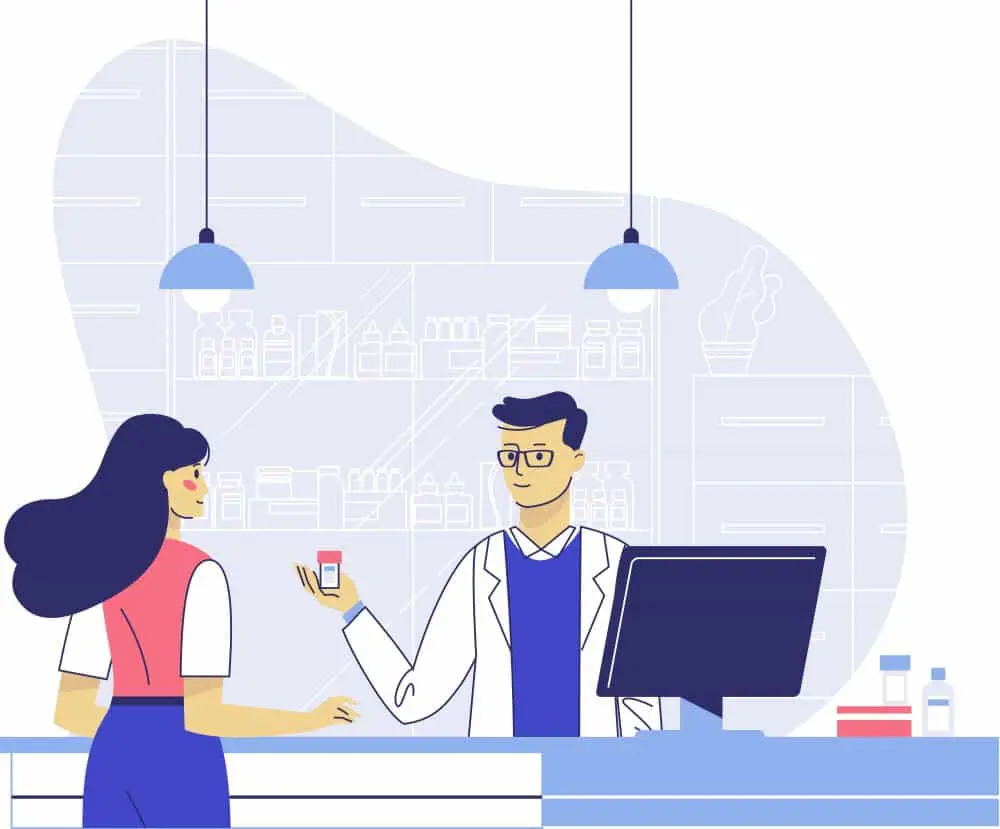
The Importance of Writing a Great Pharmacy Personal Statement
To become a pharmacist anywhere in the UK, you’ll need to be registered with the General Pharmaceutical Council (GPhC) and have, at minimum, a master’s degree from an accredited university. This requires you to enter into a graduate-level programme for pharmacology. When applying to these types of programmes, it’s very important that you have a strong pharmacy personal statement.
When it comes to applying to a pharmacy programme at the graduate level, there are many requirements to meet. Many of these come in the form of prerequisites you need before you can be considered for grad school.
Pharmacy Programme Prerequisites
The common prerequisites for applying to university for pharmacology mostly involve classes you should’ve taken before applying to the programme. These classes include three (3) A-levels in the following subjects:
- and various Maths
You must receive a grade of B or higher in each of these for it to meet the prerequisite.
You must also take five (5) General Certificates of Secondary Education, otherwise known as GCSEs, in the following subjects:
- Various Maths
- English/Language
For these courses, you must have received a grade of C or higher.
There are a few alternate routes you can take if you don’t meet the above listed prerequisites. These include having a foundational degree in the field of pharmacy, having an HNC, HND or BTEC with a science focus, having earned the equivalent qualifications at an Irish or Scottish university and a few others. Having work or internship experience with a pharmacist also helps.
Depending on the particular Uni you plan on attending, you may have some additional institutional requirements. These will be listed on the university’s website and/or in the admissions packet for the school.
Steps to Obtaining Admission
Once you’ve covered all your prerequisite courses, it’s time to start the actual process of admissions. Do your research first; find the best Uni for you and check the website to see what types of admissions requirements they have in place. Some universities require you to take the PCAT (Pharmacy College Admissions Test) and earn a certain score before they’ll consider you for admission.
If you’ve not already taken the PCAT, though, check the admissions requirements for your particular Uni to see if you need to do so. Several universities across the country are eliminating the PCAT requirement, and there’s no reason to take it if it isn’t a requirement for your specific school. The next step is to fill out and submit an application to the school.
Applications require a lot of personal information, including your name, contact information, educational history, professional resume, personal and professional references, and a pharmacy personal statement, which is one of the most important parts of the application packet. Some universities require you to pay a fee or provide them with a fee waiver when submitting your application.
After you’ve submitted your application, it’ll be reviewed by the university’s admissions team. At this point, they may call you in for an interview . After that, you should be ready to enter the pharmacy programme.
But how do you make sure you get to the interview stage? Aside from having good grades and an impressive personal resume, writing an exceptional and memorable pharmacy personal statement is the best way to make sure you’re called in for that final step.
What is a Pharmacy Personal Statement?
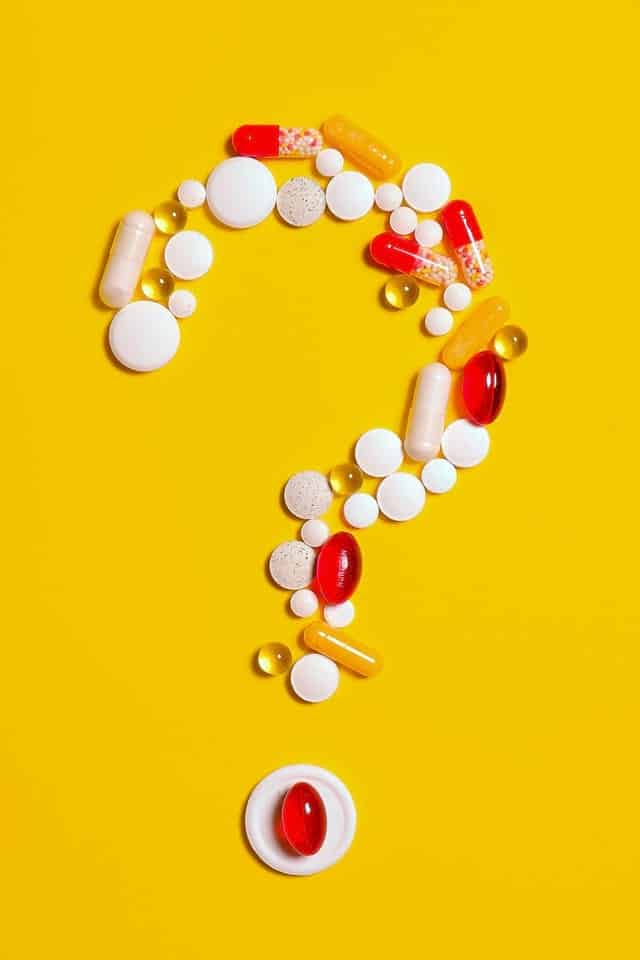
A pharmacy personal statement is a personal essay you write about yourself. Many unis will give you a specific prompt to help guide your writing. For those few that don’t, there are several things you’ll want to include , such as why you want to pursue pharmacology, what about that particular university’s programme appeals to you, any achievements or awards you’ve received, any relevant internship or work experience and why you’d make a good candidate.
There are also attributes about yourself you’ll want to mention in your personal statement. These are things you can’t simply write out in sentences. Instead, you’ll want to discuss relevant topics and tell personal stories that show that you have these qualities without you directly saying, “ I work well with others and have good communication skills. “
These important attributes include, but aren’t limited to:
- Excellent people skills
- Strong attention to detail
- Honesty and integrity
- Good communication skills
- The ability to work on a team
- Leadership skills
- Strong organisational skills
- Highly motivated to succeed
- A strong sense of responsibility and professionalism
All of these qualities make you a good candidate for a pharmacy programme. The more of these you can show you have, the more likely you’ll be called for an interview.
What is a Prompt, and Why Should You Follow It?
If your specific university provides you with a prompt, they’re simply giving you a question to help focus what you write about in your personal statement. There are several different prompts unis use, and we’ll discuss some of the most common of those later.
No matter what the prompt is, it’s important you answer it completely. Most universities use prompts relative to your interest in pharmacology, your educational history, or attributes that would make you a good candidate for their programme. There will occasionally be a prompt that surprises you though. In those cases, still, answer the prompt.
Be as honest and as thorough as you can, and remember, even if the prompt is something strange or unusual, there are usually still ways to work in stories that show you in your best light. You may just have to be a little more creative.
Below, you’ll find a few of the most common prompts for writing your pharmacy personal statement on your admissions applications.
Pharmacy Personal Statement Prompts
Prompt 1: tell us about yourself (kings university london).
Many universities use a very vague prompt that just instructs you to talk about yourself. As Kingston University London puts it, “You are the main topic of this essay.”
This is a great, easy prompt to get. Don’t be afraid to be honest and really talk yourself up in this kind of statement.
For this particular prompt, you’ll want to cover everything we mentioned above, particularly why you’re interested in pursuing a career in Pharmacy, what education you’ve had that qualifies you for the programme, any relevant work or leadership experience that would make you a good candidate and anything that showcases the attributes we listed above.
Again, be honest and as thorough as possible. Remember, the goal of this statement is to make you memorable and desirable. As a result, talking about all the great accomplishments or achievements you have isn’t bragging or boasting. It’s what’s required if you want to stand out from the other applicants.
Prompt 2: Demonstrate your commitment to pursuing a career in Pharmacy, and tell us why you’re better suited to the programme than other applicants (King’s College London).
This prompt is quite similar to the above “Tell us about yourself” prompt. In it, you’ll cover much of the same things, especially when you start talking about why you should be chosen for the programme over other applicants.
Just remember that there’s a direct question about why you want to work in pharmacology. Because it’s being asked directly, you want to spend a bit of time giving a complete answer. You can talk about why you became interested in pharmaceuticals in the first place. Was there a specific event in your childhood that inspired you to want to help take care of sick people? Have you had a strong love of chemistry for as long as you can remember? What inspired you to choose this field over all the over available career fields?
This prompt also allows you to talk about your career goals. What do you want to do with your MPharm once you get it? How is this degree going to help you in those goals, and how are you going to use your skills and your degree to make the world better once you do get a job? It would also benefit you to talk about the classes you’ve already taken and the work you’ve already done to work towards your goals.
Prompt 3: What benefits do you expect to gain from admission into our programme? (Cardiff University)
For this prompt, you can still talk a little about why you chose pharmacology and what you hope to do with your degree once you’ve earned it. More importantly, though, you’ll want to answer the actual question the prompt asks. What are you hoping to gain from this particular programme that sets it apart from all the other pharmacy programmes you could have chosen instead?
Talk about specific courses or labs for which this programme is well-known. This is a great way to showcase that you’ve done your research and really looked into what this university has to offer. By highlighting particular aspects of the programme, you prove to the admissions team you didn’t just pick this university on a whim or because it was the closest one to your flat. Instead, you did some reading and compared the programme to those at other schools and decided this one was the best fit for you because… You fill in the blanks!
Proving to a school that you know something about the school and that you hope to gain the actual knowledge and skills they’re famous for providing to students is a huge point in your favour. This specific prompt allows you to do that.
Prompt 4: Tell us about any work experience, internships, leadership positions you’ve held or outside activities that would support your application for admission (The University of Manchester).
This prompt is another one that’s similar to the “ Tell us about yourself ” prompt. In answering this prompt, you’ll be able to talk about yourself, your history, your past accomplishments, your interest in pharmacy, and more. You’ll want to put your largest focus, though, on the actual work you’ve done to prepare you for entrance into this programme.
This could include any of the following:
- Working in an actual pharmacy or closely related field
- Internships, volunteer experience or other placements within a pharmacy or related field
- Any work experience you’ve had where you were part of a team or, even better, the leader of a team
- Educational experience that would prepare you for the programme
- Any honours you’ve received that show you to be exceptional in any relevant field
These are only a few examples of things you could discuss in response to this prompt.
Standard Pharmacy Personal Statement Format
No matter the specific prompt you’re given, there’s a general format you’ll use for most personal statements. Occasionally, a university will provide you with specific formatting instructions. If they do, you always want to follow those instructions exactly. If you aren’t provided with instructions, this is the general format preferred for most UK unis and their US counterparts for essays and/or personal statements:
- MLA formatting guidelines
- One-inch margins on each side of the page
- (For the UK) Any professional font as long as the italics are noticeably different – most students use Times New Roman, Arial or Courier
- (For the US) Times New Roman or Arial font
- Font size – 12 pt.
- Double-space, but add no extra lines between paragraphs
- Indent the first line of each paragraph
Additionally, you’ll use the standard Intro-Body-Conclusion format that most MLA essays utilise.

Step 1. Introduction
Depending on the specific prompts people are given, each introductory paragraph will be a little different for each student. Generally, though, this is where you’ll introduce yourself and talk a little about why you’re interested in studying pharmacology in general and why you’re interested in studying at that university specifically. You’ll also want to catch the reader’s attention immediately, in the opening line if possible, but without using gimmicks or something overly dramatic.
According to a how-to guide on the Birmingham City University website , “The most effective opening sentences are simple, to the point and personal to you.”
You’ll also want to avoid writing in cliches or using overused phrasing that everyone else uses. Be original. Be specific. Really help the admissions team understand your drive and passion for pharmacology.
Step 2. Body Paragraphs
Your body paragraphs are where you’ll put the majority of your information. These are the paragraphs where you’ll really dive into answering the question(s) the prompt asks. Unless you’re asked to write an abbreviated personal statement of just a couple hundred words, you should never have less than two body paragraphs, and it’s better to have between three and six.
You want to be comprehensive in your writing; include everything the admissions team might need to hear to sway them in your favour. This generally takes more than a couple of short paragraphs. Remember to indent the first line of each paragraph, and make sure they’re written in an order that makes sense. Don’t jump around from paragraph to paragraph. Make sure each transitions smoothly into the other.
Step 3. Conclusion
In the conclusion of your pharmacy personal statement, you’ll want to bring your entire essay to a smooth, sensible close. Don’t use your conclusion to restate everything you’ve already written. Instead, use it as a place to briefly touch on how entrance into the programme will help you succeed in your future goals.
Also, if it feels appropriate and doesn’t detract from the overall feel of your personal statement, take the time to thank the admissions team for reading it and considering you for application into their school’s pharmacy programme. Be aware that this isn’t always appropriate. If, after adding in the thank you, it seems forced or like it was written just to add more words to an essay that was a little too short, take it out.
Examples of Pharmacy Personal Statements
Example personal statement 1.
“I have gained valuable knowledge studying Chemistry, Biology and Maths which will be beneficial for the Pharmacy course. In Chemistry, I have done a series of experiments which require analytical and evaluative skills such as accurate reading when using burettes. I find the organic Chemistry module rather interesting as I enjoy studying the different reactions of aldehydes and ketones and how these reactions and organic products differ due to the different functional groups present in each compound. Another aspect of chemistry I enjoy is the purification of organic compounds.”
– Read the rest here
This is the second paragraph of a pharmacy personal statement, and it’s a great example of how to answer a prompt that wants you to discuss any relevant experience you’ve had that could help you in the programme.
This student mentions many of the different science and mathematics courses she’s taken in pursuit of her pharmacy degree, but she doesn’t just list them. She goes into great detail about some of the things she’s done in those classes.
This is excellent for a few reasons. First of all, it’s evident in her writing that she greatly enjoyed the classes she took. This shows that she has a passion for the work she’ll have to do to obtain her MPharm. Universities much prefer to have students on campus who are truly invested in and enjoying the work they’re doing.
Additionally, she uses specific terms – “ketones,” “burettes,” “aldehydes” and more – which shows she has actual knowledge and understanding of the field. We can tell that she’s a knowledgeable, hard-working student who has, thus far, retained the information she learned in her undergraduate courses. Everything about this personal statement was done well.
Our Verdict:

Example Personal Statement 2
“I am interested in the Masters of Pharmacy (MPharm) Programme because I am interested in the modules on which it is based. I want to do the MPharm programme so as to extend my knowledge in Medicines. I would like to get a deeper understanding of how to formulate and administer drugs safely.
I would qualify for the Mpharm programme because I have recently completed BSc in pharmaceutical Science which has given me good understanding of how drugs work. The modules I have undertaken In my BSc Pharmaceutical Science will help me navigate successfully in the MPharm programme.”
This personal statement is a little less impressive than the first one. First of all, there’s not really an opening line. When writing a pharmacy personal statement – or a personal statement of any kind, for that matter – you want to have a nice first sentence that breaks the ice and starts the statement off in a fluid manner. This student just jumps right in and answers the question being asked. There’s no lead-in, no story being told.
The grammar in this particular sample isn’t great either. There are randomly capitalised words (“undertaken In my BSc”) and missing words (“given me good understanding”) and a few other problems that could have been addressed by good editing. This is a testament to why you should always proofread and edit your papers before submitting them. It’s even better to give them to a new set of eyes to edit for you if possible.
The two most bothersome things about this sample, though, is that it’s vague, and the sentences are choppy. The student mentions things he’s done (“ recently completed BSc in pharmaceutical Science “) and why he wants to be in the programme (“ because I am interested in the modules on which it is based “), but he gives absolutely no specifics.
He doesn’t talk about anything he learned in his BSc courses that furthered his love of pharmacology, and while he says he’s interested in the programme’s modules, he doesn’t mention a single specific module or why it interests him. We’re just given the bare minimum with no detail – the burger without the cheese and veggies. It’s boring.

Finally, his sentences are horribly choppy. With the exception of one single sentence, each of his sentences starts with the word “I” – “I am,” “I want,” “I would.” There is no variation at all to his writing. It’s boring and makes the reader lose interest. You’ll want to change up the flow and style of your sentences regularly. It adds a little flair and makes your personal statement less monotonous.

Example Personal Statement 3
“Pharmacy has the ability to change people’s lives. Whether it is at the level of the community pharmacist offering the best advice possible to common illnesses, to high-level research into drugs that could cure a range of chronic or life-threatening diseases, the role of the pharmacist cannot be overestimated. As a motivated and hardworking individual, with a desire to understand the fascinating human body along with a joy of helping other people, I strongly believe that studying pharmacy will give me one of the final and most important step towards a rewarding career in the developing field of pharmacy.”
This is another stellar example of what a pharmacy personal statement should be. The writer begins strong with a unique and memorable opening sentence. He tells us, right from the first sentence, one of the reasons he wants to work in the field of pharmacology, but he does so without monotonously and obviously saying, “ I want to be a pharmacist because I think pharmacy can change people lives .” Instead, he simply and concisely says, “ Pharmacy has the ability to change people’s lives. “
It’s a great opening line, and it gives us insight into his reasons for going into the pharmacy field as well. He follows that up with a sentence that shows he’s knowledgeable about different career opportunities in the field of pharmacology.
Then he smoothly transitions into why he, himself, would do well in this field. He tells us he’s hardworking and motivated, but he does so in a way that doesn’t just state those facts outright without context.
He then once again tells us about his interest in the field and also shows us he is someone who enjoys working with and helping others. Finally, he sums up his introduction by leading into what he hopes to gain from the programme.
Although the next paragraph isn’t listed here, it, too, is a smooth transition into the educational and work experiences he’s had that prepared him to do well in the programme. Everything about this personal statement is well-organised, with each paragraph flowing smoothly into the next, and the whole thing covering everything that should be covered in a personal statement.

Example Personal Statement 4
“I am interested in studying chemistry and biology because I would like a career that plays crucial role in public’s health.
I was previously working as a retail assistant and the experience has led me to deal and understand different kind of people. I learnt to keep myself calm, whilst working under pressure environments.
This job has also taught me to work in a fast-paced environment to meet the customer`s demands. This skill will be useful to meet the deadlines while doing my course and working as a pharmacist will enable me to provide good customer services.”
This personal statement is another example of what not to do when writing your own statement for admission into the pharmacy programme.
First of all, the introduction paragraph, shown here in its entirety, is much too short. You have to be an excellent writer to turn one sentence into a paragraph and make it work, and this writer didn’t do that. Your introduction should never be only one sentence. It needs to be fleshed out and thoroughly written. There are some glaring grammatical errors as well.
The next problem with this statement is that the work experience the student writes about isn’t really relevant to the programme she’s trying to enter into. She does an admirable job of trying to make it relevant, by talking about how it helped her learn to work with a multitude of different people and taught her to work quickly, but it doesn’t really work.
Most unis want to know that you have relevant work experience. If you don’t, it’s better to mention placement experiences or internships you’ve had that are relevant as opposed to irrelevant work experience. Even if you only worked in a pharmacy for a day as part of a class project, that’s okay. You can learn a lot in a day, and you can make that work in your writing.
Unless you’re really good at making non-relevant experience seem like it has actual relevance to the programme, it’s better to leave it out altogether. That’s not to say you can’t mention having retail or fast food experience, but you have to make sure that you meticulously explain how that experience is relevant to the pharmacology field.

Example Personal Statement 5
“The enthusiasm I have for the sciences – specifically Chemistry – encouraged me to think about my future career and how a chemistry-related degree could be a possibility for me. I have always enjoyed maths and science throughout my education and I have recognised that I can combine both in a career in pharmacy. I believe pharmacy to be a fast-developing profession and recognise that pharmacists are heavily involved in the introduction of new medicines for all kinds of illnesses, and I find the prospect of working in this field inspiring.”
While this isn’t the best example of a personal statement, it’s far from being the worst. This is considered an average statement. The writer does a good job hitting all the points he should cover in his introduction – why he became interested in the field of pharmacy, a basic knowledge of the job description of a pharmacist and why he wants to work in the field in the future – but doesn’t do it in a way that’s incredibly memorable.
It isn’t the strongest introduction paragraph to a personal statement, but at the same time, it’s fair; it isn’t bad. It’s well-organised; the grammar is mostly as it should be, and the subject of why he wants to enter the programme is well covered. It doesn’t grab our attention and make us want to read more though. In short, this is an introductory paragraph that could go either way.
Although not shown here, the rest of this statement turned out pretty good. The writer found his flow and dived into the subject with an appropriate amount of detail, good grammar and a few memorable points. The strength of his body paragraphs and conclusion made up for his less-than-exceptional introduction, and that’s okay.
We included this sample to show that sometimes you get off to a bit of a slow start and can still finish well. It’s better to start strong, but introductions can be tough. As long as the intro isn’t bad and you make up for the average intro in your body paragraphs and conclusion, you’ll usually be okay.

A Few Final Notes
hile it’s certainly true that grades and work experience are important when applying to uni to work on your MPharm, your pharmacy personal statement is equally important. Universities get huge volumes of applications for their pharmacy programmes. They get so many applications that many of them have a “Due to the large volume of applications we receive…” disclaimer on their websites.
Your personal statement is where you can be creative and ensure your essay stands out from the rest. Be sure you check out the formatting requirements ahead of time and stick to them exactly.
Also, make sure you read the personal statement prompt well and understand it before you start writing. Finally, make sure you edit your paper several times before submitting it.
Have a friend, loved one, mentor or former professor look over it as well. Where possible, get a reputable online personal statement review service to help ( me shamelessly plugging in our services page lol ) Sometimes, a fresh set of eyes can find mistakes your own eyes can’t.
Be honest and thorough in your response to the prompt, and never try to plagiarise someone else’s work. It never works. It helps to run a plagiarism checker on your final draft- just to be sure!
Finally, be sure you stick to the length requirements. If the statement is supposed to be between 500 and 750 words, make sure that’s what it is. Don’t stop at 490 words and assume it will be enough, and don’t go over an extra 50 words and assume the admissions team will be okay with it. These people read a lot of personal statements; they set a maximum word count for a reason.
Most importantly, do your best, and fill your personal statement with passion. If an admissions team can tell that you’re passionate about your education and your subsequent career in pharmacy, you’ve already won half the battle.
13 Best Books for Nursing Students to Read- Reviewed
5 Best MCAT Prep Books, According to Med Students
5 Best MCAT Prep Courses, According to Med Students
Leave a Comment Cancel reply
Save my name, email, and website in this browser for the next time I comment.
This site uses Akismet to reduce spam. Learn how your comment data is processed .
Advertise With Us
Advertising Disclosure
Privacy Policy
Cookie Policy
As an Amazon Associate (and a participant of other affiliate programs), this site earns from qualifying purchases.
© 2024 TheCollegeApplication.com, a Delicto Holdings Company | All Rights Reserved
Health Professions Advising
Pre-health advising.
- Health Professions Resources
Personal Statements
Health Professions Advising CBB 203/205 (Second Floor) E: [email protected]
Schedule a Health Professions Advising Appointment
Mailing Address: University of Houston ATTN: Health Professions Advising Center University Classroom & Business Building Room 215 4242 Martin Luther King Boulevard Houston, TX 77204 Google Maps

Although most applicants focus on GPA and test-scores, the personal statement is a very important component of your application and should be carefully composed. This is your opportunity to highlight things about yourself that may not be mentioned in other sections of your application and to distinguish yourself from other applicants.
You should have several different people objectively read your personal statement and provide constructive feedback. In addition to the Health Professions Advisory Committee (HPAC) , your letter writers are often a great option. There are also resources on campus that can assist you, such as the UH Writing Center , University Career Services , and your major advisor. Consider the feedback you receive carefully, but be sure that the personal statement is still written in your voice!
Below we have outlined some advice and general guidelines to consider while writing your personal statement. Keep in mind that these recommendations are not restricted to medical/dental applications, but can be applied while writing essays for any healthcare professional program.
- See also UH University Career Services Personal Statement Tips
- Sign up for the UH Writing Center Personal Statement Workshops
Types of Prompts
Before beginning your personal statement, it is important you carefully review the specific question (or prompt) that is being asked and the character-limit, as there can be distinct differences between the application services.
TMDSAS ( 5000 characters ):
- Explain your motivation to seek a career in medicine. You are asked to include the value of your experiences that prepare you to be a physician.
- Explain your motivation to seek a career in dentistry. You are asked to discuss your philosophy of the dental profession and indicate your goals relevant to the profession.
- Personal Characteristics Essay - Learning from others is enhanced in educational settings that include individuals from diverse backgrounds and experiences. Please describe your personal characteristics (background, talents, skills, etc.) or experiences that would add to the educational experience of others. The personal characteristics essay is required to all applicants and limited to 2500 characters, including spaces.
- Optional Essay – The optional essay is an opportunity to provide the admissions committee(s) with a broader picture of who you are as an applicant. The essay is optional, however, you are strongly encouraged to take advantage of this opportunity. Consider briefly discussing any unique circumstances or life experiences that are relevant to your application which have not previously been presented. Optional Essay is limited to 2500 characters, including spaces.
AMCAS ( 5300 characters ):
- Why have you selected the field of medicine?
- What motivates you to learn more about medicine?
- What do you want medical schools to know about you that has not been disclosed in other sections of the application?
AACOMAS ( 5300 characters ):
- What motivates you to learn more about osteopathic medicine?
AADSAS ( 4500 characters ):
- Explain a defining moment that helped steer you toward a career in dentistry. Consider using that moment as the focal point of your essay.
- Be colorful, positive, imaginative and personal when discussing why you are a good candidate for dental school. Ask yourself—in a pile of 100 applications, would I enjoy reading my statement? Be sure to convey your passion for dentistry in your statement.
- Be yourself. Don’t use jargon, clichés or big phrases that you would not use in daily conversation. Remember, dental schools want to know about the real you.
- Be original and thoughtful: Discuss how you would contribute to the profession and patient care, all of which will help you stand out from other applicants.
AACPMAS (4500 characters):
- State below why you are interested in becoming a Doctor of Podiatric Medicine. Provide information about your development for a career in Podiatric Medicine
CASPA (5000 characters):
- In the space provided write a brief statement expressing your motivation or desire to become a physician assistant.
OptomCAS (4500 characters) :
Essays can be customized for each individual Optometry program. Most Optometry schools include this as their main essay question:
- Please describe what inspires your decision for becoming an optometrist, including your preparation for training in this profession, your aptitude and motivation, the basis for your interest in optometry, and your future career.
OTCAS (no character limit):
- Your Personal Statement should address why you selected OT as a career and how an Occupational Therapy degree relates to your immediate and long-term professional goals. Describe how your personal, educational, and professional background will help you achieve your goals.
PTCAS (4500 characters):
- Prompt: Every person has a story that has led them to a career. Since there are a variety of health professions that "help" others, please go beyond your initial interaction or experiences with physical therapy and share the deeper story that has confirmed your decision to specifically pursue physical therapy as your career.
PharmCAS (4500 characters):
- Your Personal Essay should address why you selected pharmacy as a career. How the Doctor of Pharmacy degree relates to your immediate and long-term professional goals. You should describe how your personal, educational, and professional background will help you achieve your goals.
VMCAS (1000 characters):
- There are many career choices within the veterinary What are your future career goals and why?
- In what ways do veterinarians contribute to society and what do you hope to contribute?
- Consider the breadth of society which veterinarians What attributes do you believe are essential to be successful within the veterinary profession? Of these attributes, which do you possess and how have you demonstrated these in the past?
When should I start writing?
You should begin working on your personal statement early in the spring semester prior to your intended application year and submitting your application materials to HPAC (if applicable). Remember that the people who are helping you with your statement will need time to review it and you will need time to work through multiple drafts before submission. In addition, some of your letter writers may want to see a copy of your personal statement before they write your letter, so you should strive to have a competent draft by mid-March.
What should be included?
It is important to treat the personal statement as an answer to a question (i.e., the prompt), rather than the opportunity to flex your creative writing muscles. Indeed, most applicants are STEM majors without much experience in creative writing; therefore, it is recommended that you avoid using the essay to practice your creative writing skills and stick to simply addressing the prompt in a direct, concise way. Some questions you may want to consider while planning your essay are:
- Why have you selected the field of medicine, dentistry, or other health profession?
- What motivates you to learn more about medicine, dentistry, or other health profession?
- How have you demonstrated your interest and commitment to your decision?
- What experiences have allowed you to develop the skills necessary to be successful in this program and to become an effective physician, dentist, PA, etc.?
- Did you have any exposure to role models who influenced your decision? Which of their attributes inspired you?
- Are your perceptions of this profession realistic?
- What are your professional goals?
- Is there anything you wish for your chosen health professional schools to know about you that has not been disclosed in other sections of the application?
Depending on the nature of the prompt, you may also wish to include information such as:
- Unique hardships, challenges, or obstacles that may have influenced your educational pursuits.
- Commentary on significant fluctuations in your academic record that are not explained elsewhere in your application.
What should NOT be included?
- Avoid clichés and over-using/mis-using terms : How many times do you think admissions committees have read the phrase, “I want to become a physician because I like science and I want to help people”? Similarly, words like empathy and passion are, while applicable, can become empty in meaning when overused or misused. Consider exemplifying these terms, rather than simply stating them.
- Avoid unnecessary drama: While you may feel compelled to "hook" the reader with a dramatic opening to your statement, doing so may detract from the overall purpose (i.e., describing your decision to pursue medicine/dentistry) and may induce many an eye-roll by committee members.
- Avoid being vague : "[Insert experience] was challenging and rewarding." What does that mean? Be specific about what was impactful and how it affected you.
- Avoid brash decision-making : Your decision to become a doctor/dentist should be the result of a series of thoughtful, conscious, and reflective decisions. NOT an instantaneous realization or epiphany. Similarly, you have not “always known” that you want to be a physician/dentist. No one is "born to be a doctor." Nothing is innate, you have to work for it.
- Avoid excuses : In general, there are better uses for your personal statement than explaining away and justifying poor grades, incidents of misconduct, etc. Indeed, TMDSAS offers additional essays and opportunities to discuss these issues. However, if you choose to address these subjects, be sure to focus on what you have learned from those incidents and how your experiences have made you a stronger person. Always accept responsibility and avoid blaming anyone else for your decisions or mistakes.
- Avoid restating your resume or activities section : Choose ONE or TWO significant and distinguishing experiences to elaborate upon when outline the reasons behind your decision to pursue a career in healthcare. There is no need to narrate completely your 4+ years of college or carefully detail your activities from year to year; indeed, there are other sections in the application where you can detail your experiences and what you learned from each.
- Avoid grandiosity : Claiming that you plan to cure cancer (or HIV, or healthcare disparities, or anything else) shows a grave lack of understanding of whatever problem you are planning to solve. Similarly, avoid “I know what it is like to be a physician/dentist from [shadowing/clinical volunteer experience].” No, you do not. That is precisely why you are hoping to go to medical/dental school.
- Avoid inflammatory or controversial topics : You do not know the values, beliefs, and background of the committee member reading your essay. For these reasons, you are advised to avoid making any strong statements regarding politics, religion, and other polarizing topics. Be extremely cautious to avoid expressing any views that could be construed as derogatory to any group. Additionally, your beliefs are not the only “correct” beliefs.
- Do not lie : Honesty and ethical behavior are the hallmarks of being a healthcare professional. Do not include details anywhere in your application or essay that you are not prepared to talk about or that are simply untrue.
Additional Recommendations
- Use simple formatting : Avoid the use of bullet-points, italics, and symbols.
- Read your statement aloud : As you draft your statement, reading what you have written aloud can help you determine whether your writing "flows" well and is an easy read for a reviewer.
- Applying to Uni
- Apprenticeships
- Health & Relationships
- Money & Finance
Personal Statements
- Postgraduate
- U.S Universities
University Interviews
- Vocational Qualifications
- Accommodation
- Budgeting, Money & Finance
- Health & Relationships
- Jobs & Careers
- Socialising
Studying Abroad
- Studying & Revision
- Technology
- University & College Admissions
Guide to GCSE Results Day
Finding a job after school or college
Retaking GCSEs
In this section
Choosing GCSE Subjects
Post-GCSE Options
GCSE Work Experience
GCSE Revision Tips
Why take an Apprenticeship?
Applying for an Apprenticeship
Apprenticeships Interviews
Apprenticeship Wage
Engineering Apprenticeships
What is an Apprenticeship?
Choosing an Apprenticeship
Real Life Apprentices
Degree Apprenticeships
Higher Apprenticeships
A Level Results Day 2024
AS Levels 2024
Clearing Guide 2024
Applying to University
SQA Results Day Guide 2024
BTEC Results Day Guide
Vocational Qualifications Guide
Sixth Form or College
International Baccalaureate
Post 18 options
Finding a Job
Should I take a Gap Year?
Travel Planning
Volunteering
Gap Year Guide
Gap Year Blogs
Applying to Oxbridge
Applying to US Universities
Choosing a Degree
Choosing a University or College
Personal Statement Editing and Review Service
Guide to Freshers' Week
Student Guides
Student Cooking
Student Blogs
- Top Rated Personal Statements
Personal Statement Examples
Writing Your Personal Statement
- Postgraduate Personal Statements
- International Student Personal Statements
- Gap Year Personal Statements
Personal Statement Length Checker
Personal Statement Examples By University
Personal Statement Changes 2025
- Personal Statement Template
Job Interviews
Types of Postgraduate Course
Writing a Postgraduate Personal Statement
Postgraduate Funding
Postgraduate Study
Internships
Choosing A College
Ivy League Universities
Common App Essay Examples
Universal College Application Guide
How To Write A College Admissions Essay
College Rankings
Admissions Tests
Fees & Funding
Scholarships
Budgeting For College
Online Degree
Platinum Express Editing and Review Service
Gold Editing and Review Service
Silver Express Editing and Review Service
UCAS Personal Statement Editing and Review Service
Oxbridge Personal Statement Editing and Review Service
Postgraduate Personal Statement Editing and Review Service
You are here
- Mature Student Personal Statements
- Personal Statements By University
- Accountancy and Finance Personal Statements
- Actuarial Science Personal Statements
- American Studies Personal Statements
- Anthropology Personal Statements
- Archaeology Personal Statements
- Architecture Personal Statements
- Art and Design Personal Statements
- Biochemistry Personal Statements
- Bioengineering Personal Statements
- Biology Personal Statements
- Biomedical Science Personal Statements
- Biotechnology Personal Statements
- Business Management Personal Statement Examples
- Business Personal Statements
- Catering and Food Personal Statements
- Chemistry Personal Statements
- Classics Personal Statements
- Computer Science Personal Statements
- Computing and IT Personal Statements
- Criminology Personal Statements
- Dance Personal Statements
- Dentistry Personal Statements
- Design Personal Statements
- Dietetics Personal Statements
- Drama Personal Statements
- Economics Personal Statement Examples
- Education Personal Statements
- Engineering Personal Statement Examples
- English Personal Statements
- Environment Personal Statements
- Environmental Science Personal Statements
- Event Management Personal Statements
- Fashion Personal Statements
- Film Personal Statements
- Finance Personal Statements
- Forensic Science Personal Statements
- Geography Personal Statements
- Geology Personal Statements
- Health Sciences Personal Statements
- History Personal Statements
- History of Art Personal Statements
- Hotel Management Personal Statements
- International Relations Personal Statements
- International Studies Personal Statements
- Islamic Studies Personal Statements
- Japanese Studies Personal Statements
- Journalism Personal Statements
- Land Economy Personal Statements
- Languages Personal Statements
- Law Personal Statement Examples
- Linguistics Personal Statements
- Management Personal Statements
- Marketing Personal Statements
- Mathematics Personal Statements
- Media Personal Statements
- Medicine Personal Statement Examples
- Midwifery Personal Statements
- Music Personal Statements
- Music Technology Personal Statements
- Natural Sciences Personal Statements
- Neuroscience Personal Statements
- Nursing Personal Statements
- Occupational Therapy Personal Statements
- Osteopathy Personal Statements
- Oxbridge Personal Statements
- Pharmacy Personal Statements
- Philosophy Personal Statements
- Photography Personal Statements
- Physics Personal Statements
- Physiology Personal Statements
- Physiotherapy Personal Statements
- Politics Personal Statements
- Psychology Personal Statement Examples
- Radiography Personal Statements
- Religious Studies Personal Statements
- Social Work Personal Statements
- Sociology Personal Statements
- Sports & Leisure Personal Statements
- Sports Science Personal Statements
- Surveying Personal Statements
- Teacher Training Personal Statements
- Theology Personal Statements
- Travel and Tourism Personal Statements
- Urban Planning Personal Statements
- Veterinary Science Personal Statements
- Zoology Personal Statements
- Personal Statement Editing Service
- Personal Statement Writing Guide
- Submit Your Personal Statement
- Personal Statement Questions 2025
- Personal Statement Changes 2024
Pharmacy Personal Statement Examples
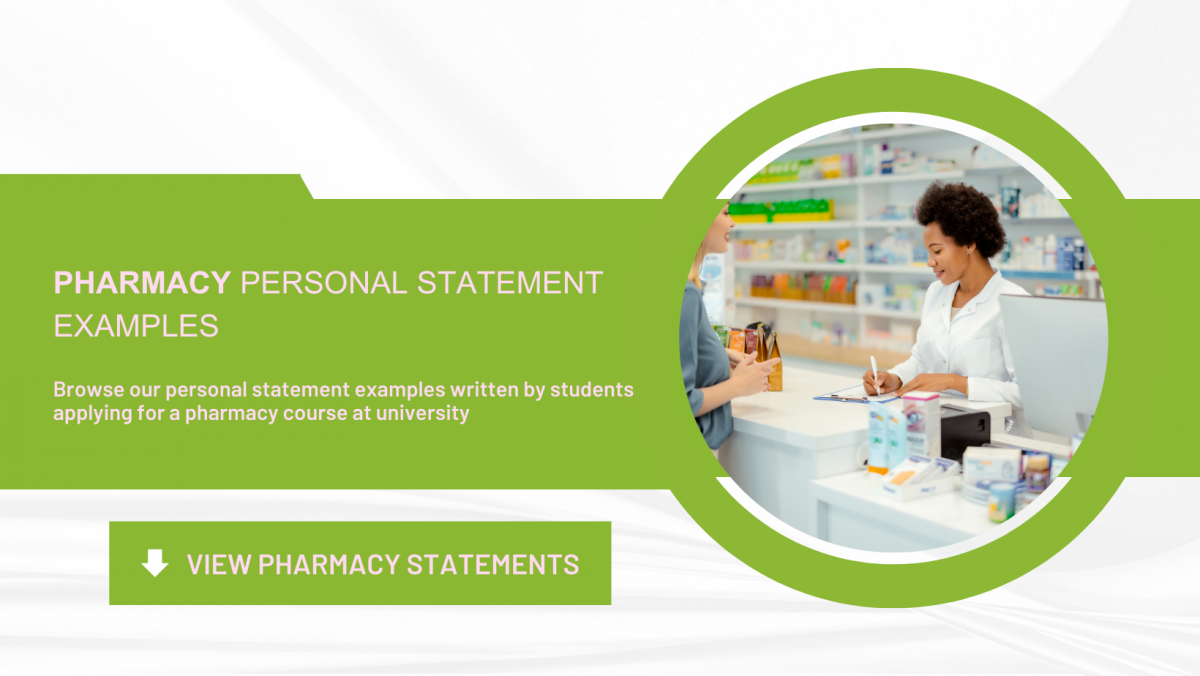
What is a pharmacy personal statement?
Writing a personal statement for pharmacy is a chance to sell yourself to the admissions tutors and show them why you would make a great phramacy candidate.
It’s a place to describe your skills and strengths, as well as your career plans.
You are allowed up to 4,000 characters to explain why you are applying for a pharmacy degree, so you need to make sure your statement is as polished as possible to stand out from the crowd.
How do I write a good pharmacy personal statement?
Good pharmacy personal statements always use evidence to support their claims. You need to convince admissions tutors that you’re a good match for the programme, so if you claim to be committed or inquisitive, then use examples from your life to back it up.
To write a great pharmacy personal statement you need to start early, brainstorm some ideas, and then begin your first draft.
This will then need to be carefully revised and edited before asking family and friends for feedback. Incorporate their comments and suggestions, and see how it is improved before asking them to look at it again.
Read through our pharmacy personal statement examples to give you an idea of what a good pharmacy statement looks like.
Make sure you proofread your statement for grammar and spelling before sending it off, and if you feel you need a little extra help, take a look at our personal statement editing services .
What should I include in my pharmacy personal statement?
Many students choose to start their statement by picking a specific aspect of pharmacy and explaining why they enjoy it, e.g. drug chemistry, cardiovascular and renal systems, etc.
Admissions tutors want candidates that are as passionate about the subject as they are.
As well as your motivations for studying pharmacy, think about your hobbies and extracurricular activities too. What skills have you learned from these and how will these help you in your pharmacy degree?
Talk about any work experience placements you have completed, e.g. shadowing a doctor or nurse, or someone in a similar medical/clinical profession. What did you take away from this experience? Do you feel you have all the necessary personal traits and qualities that make a good pharmacy student?
Your wider reading is also important, so it's worth mentioning anything you've read recently that you found interesting and why. Generally, admissions tutors like students who express their views and opinions, and can back them up with evidence.
For more help and advice on what to write in your pharmacy personal statement, please see:
- Personal Statement Editing Services
- Personal Statement Tips From A Teacher
- Analysis Of A Personal Statement
- The 15th January UCAS Deadline: 4 Ways To Avoid Missing It
- Personal Statement FAQs
- Personal Statement Timeline
- 10 Top Personal Statement Writing Tips
- What To Do If You Miss The 15th January UCAS Deadline.
What can I do with a pharmacy degree?
There are many different career options open to those wishing to study pharmacy at university. These include:
Jobs directly related to your degree include:
- Community pharmacist
- Hospital pharmacist
- Research scientist
Jobs where your degree would be useful include:
- Clinical research associate
- Higher education lecturer
- Medical sales representative
- Medical science liaison
- Pharmacologist
- Product/process development scientist
- Regulatory affairs officer
- Research scientist (life sciences)
- Science writer
- Toxicologist
For more information about careers with a pharamcy degree, please see Prospects and the National Careers Service .
What are the best UK universities for pharmacy?
Currently, the best universities in the UK for studying pharmacy and pharmacology are:
For more information about pharamacology university rankings in the UK, please see The Complete University Guide and SI UK .
Related resources
A level results day.

Find out more
Clearing Guide

Replying To UCAS Offers

Waiting For University Offers

How To Apply To University

8 Personal Statement Mistakes To Avoid

7 University Interview Mistakes

Uni Open Day Tips

Clearing Universities & Courses
Clearing advice.
Recommended Clearing Universities
Popular Course Categories
Course search & discover.
Start the search for your uni. Filter from hundreds of universities based on your preferences.
Search by Type
Search by region.
Recommended Universities

Ravensbourne University London
London (Greater) · 88% Recommended
.jpg)
The University of Law
London (Greater) · 92% Recommended

City, University of London
Search open days.
What's new at Uni Compare

University of Sunderland
Unlock your potential at one of the world’s best young universities (THE, 2023).

Staffordshire University
Apply to the uni ranked 2nd for quality teaching (THE, 23).
Ranking Categories
Regional rankings.
More Rankings
Top 100 Universities
Taken from 65,000+ data points from students attending university to help future generations
About our Rankings
Discover university rankings devised from data collected from current students.
Guide Categories
Advice categories, recommended articles, popular statement examples, statement advice.

What to include in a Personal Statement

Personal Statement Tips
Personal statement examples pharmacology personal statements.
Discover personal statement examples written by students accepted onto pharmacology and related courses. Read through the examples to help shape your own personal statement.
Pharmacology Personal Statements
Submitted by anonymous
Pharmacy Personal Statement
My fascination in Pharmacy began when shadowing a Pharmacist on a hos...
Mharm (Pharmacy) Personal Statement
Reading the uses, interactions and side-effects of a drug was what in...
Submitted by Hasnan
Pharmacy (Masters) Personal Statement
Why Pharmacy? I considered a range of medical career options but afte...
Submitted by Sonal
I am interested in pursuing a career in Pharmacy as I have a passion ...
Submitted by Imaan
Pharmacy MPharm Personal Statement
My experience of shadowing a community pharmacist was a watershed in ...
Submitted by Amy
Pharmacology Personal Statement
I would like to study Pharmacology at university as I am fascinated t...
Pharamacology Personal Statement
Submitted by Zumeya
My desire to study Pharmacy has come after thorough research into the...
Submitted by Erin
From the science behind the design and production of medicines to the...
Pharmacology Personal Statement Advice
Your personal statement is the final piece of the puzzle for your UCAS application and is arguably the most important one. Your Pharmacology personal statement is your chance to really sell yourself to a university and is also the chance to show your passion for the subject. Universities love to see students with passion and a real vested interest in the subject. When writing your Pharmacology personal statement, we recommend having a quick look at some Pharmacology personal statement examples beforehand. These examples will give you a sense of the tone you should use, the kind of things you should be including and what structure your Pharmacology personal statement should be following. Your Pharmacology personal statement doesn’t need to be War and Peace, but it should be a clear and concise picture of you and who you are. Don’t worry about the character count, you can easily write 4,000 words once you get into the swing of things. One quick tip from us, is when you're writing your Pharmacology personal statement, we recommend trying to link as much of the content back to Pharmacology where possible, as this will make the statement more cohesive and synergetic.
Want to learn more about a university?
Get your questions answered by sending them an enquiry now.
undergraduate Universities
Undergraduate uni's.

Ravensbourne
.jpg)
246 courses

Goldsmiths, UOL
272 courses

Uni of Surrey
437 courses

ARU Writtle
103 courses

West London IoT

Uni of Sunderland
200 courses

Uni of East London
299 courses

Leeds Arts University

Kingston Uni
386 courses

Uni of Chester
402 courses

Cardiff Met Uni
304 courses

Northeastern Uni

Uni of Winchester
166 courses

Uni of Hertfordshire
418 courses

Uni of Suffolk
106 courses

528 courses

Uni of Bradford
197 courses

Uni of Bedfordshire
343 courses

Uni for Creative Arts
323 courses

Coventry Uni
446 courses

Leeds Beckett Uni
325 courses

Staffordshire Uni
276 courses

Heriot-Watt Uni
207 courses

Uni of Leicester
267 courses

Anglia Ruskin Uni
463 courses

Uni of Westminster
331 courses

Uni of Essex
802 courses
,-Bristol.jpg)
UWE, Bristol
250 courses

Wrexham Uni
168 courses

Uni of C.Lancashire
440 courses

Uni of Kent
429 courses

Uni of Roehampton
270 courses

Middlesex Uni
313 courses

238 courses

Uni of Reading
393 courses

415 courses

Swansea Uni
782 courses

Escape Studios

365 courses

Uni of Huddersfield
453 courses

Uni of Brighton
252 courses

Bath Spa Uni
295 courses

Edge Hill Uni
245 courses

Uni of Portsmouth
370 courses

Uni of Hull
273 courses

Nottingham Trent
531 courses

Edinburgh Napier
184 courses

Queen's Uni
410 courses
Find the latest from Uni Compare

Bath Spa University
Pick Bath Spa, awarded the Uni of the Year for Social Inclusion!

University of East London
The University of East London has been shortlisted as the Uni of the Year! (THE 2023)
Our websites may use cookies to personalize and enhance your experience. By continuing without changing your cookie settings, you agree to this collection. For more information, please see our University Websites Privacy Notice .
Writing Center
Personal statements.
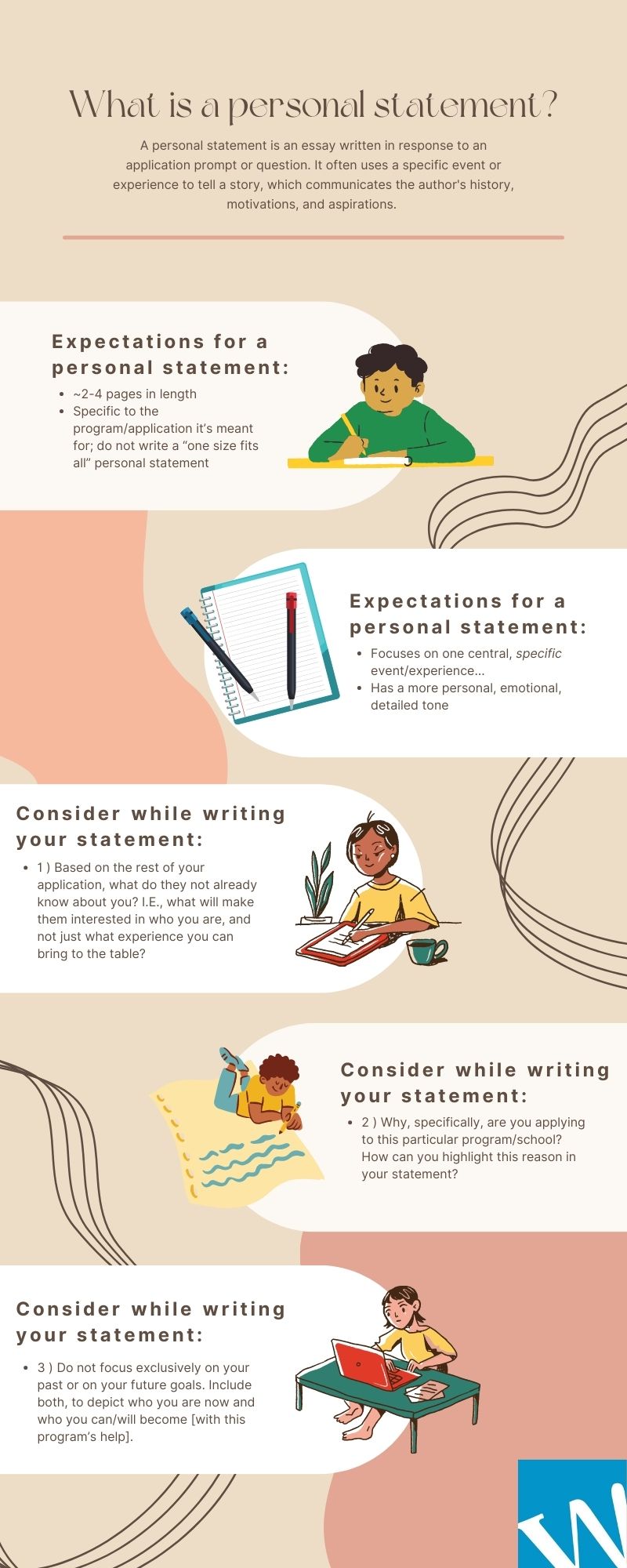
How to Write a Personal Statement
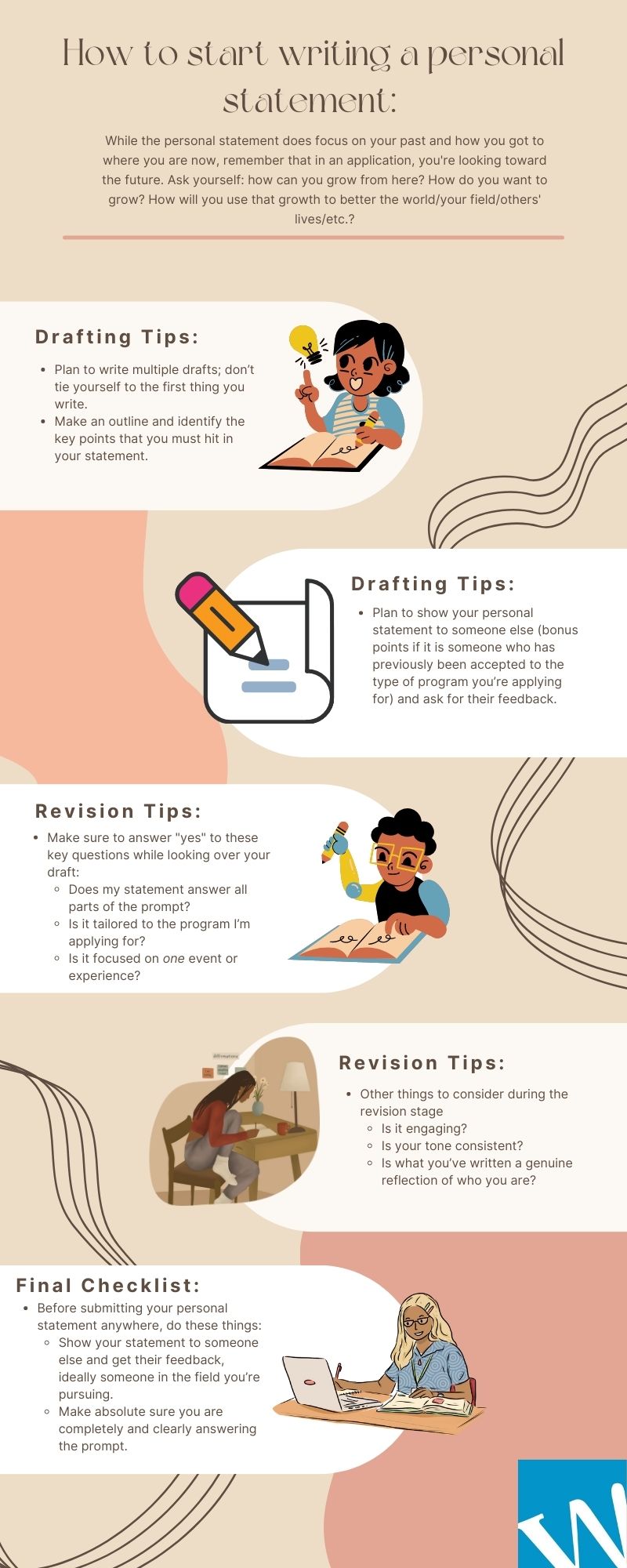
We offer these examples for you to adapt to your needs and the requirements of your application(s). Don’t feel pressured to copy them exactly! Each of these examples are written by UConn students, but for different types of programs:
Undergraduate Programs
NEAG School of Education Personal Statement (pdf)
School of Pharmacy Personal Statement (pdf)
Graduate Programs
English Ph.D. Statement of Purpose (pdf)
Medical School Personal Statement (pdf)
Social Psychology Ph.D. Personal Statement (pdf)
These various sites from other university writing centers offer additional advice on personal statements.
Indiana University
UMass Amherst Writing Center
Purdue Online Writing Lab Graduate School Application Guide

IMAGES
VIDEO
COMMENTS
Updated: Jan 01, 2024. Pharmacy school personal statement examples demonstrate that pharmacy school applications require many different documents to adequately assess you as a potential candidate. In addition to looking at your CV, transcripts, letters of recommendation, and any other required materials, most pharmacy programs ask you to submit ...
Begin to formulate your narrative. Lay out the structure and the different sections. There's no specific format that pharmacy schools are looking for, so make this personal statement unique to yourself. As mentioned, the "cookie cutter" approach to this part of the application is where most students stumble. Use your time wisely and start ...
There are different types of personal statements, generally prompted or unprompted, but they all tend to be between 400-1,000 words long. 3. Edit! Check your personal statement for basic grammatical and spelling mistakes, as well as making sure your tone is both professional and friendly. Make sure your organization makes sense.
Include only pharmacy-related experiences. 6. Avoid plagiarism. Committee members can always see through plagiarized works, so avoid this at all costs. This will only destroy your credibility in the field. 7. Avoid controversial topics. The personal statement is not a discussion ground for questionable topics.
Avoid clichés. Cue eye roll from the admissions committee who is forced to read hundreds of statements, many with poor attempts to use clichés or humor. Do not talk about controversial topics. The essay should be professional. Topics like religion, personal emotions, money, and politics have no place in the workplace.
Here are some practical tips to keep in mind when writing your pharmacy school personal statement: Start early: Give yourself plenty of time to write a strong personal statement. This isn't something that can be rushed, so start thinking about it well before the application deadline. Be specific: Don't just say that you want to become a ...
GeneralOutline of a Personal Statement. Disclaimer: There is NO specific or "correct" formula for a personal statement! I. Introduction - Draw the reader in with a story or hook. Provide background or context as to why you chose pharmacy as a career. II. Supporting Paragraphs (2-3) - Develop your argument by evaluating your experiences and claims.
Take any constructive feedback with a positive attitude and work on bettering your final copy. 10. Display Confidence. It requires immense sincerity and self-reflection to write a pharmacy school personal statement. For your readers, to relate better to your essay, you must also consider their point of view.
PTCAS (Physical Therapy): "Reflect on a meaningful experience in your life and share how that experience influenced your personal growth, such as your attitudes or perceptions." - 4,500 characters PharmCAS (Pharmacy): "Your Personal Essay should address why you selected pharmacy as a career; how the Doctor of Pharmacy degree relates to your immediate and long-term professional goals.
Make sure that your curriculum vitae describes your activities and roles as bullet points as it pertains to research, leadership, ad-vanced pharmacy practice experiences, work experience, and community service. Avoid using fancy fonts or paper colors that will distract from your curriculum vitae or personal statement.
Your personal statement is your spotlight moment on the stage of your pharmacy school application. It's your chance to step out from the shadows of grades and test scores, and into the light of your unique story. ... So, while the standard answer is four years, the actual length of your pharmacy school journey can vary based on your personal ...
Pharmacy School Personal Statement Introduction. Updated: Mar 31, 2023. When you are writing your pharmacy school personal statement introduction, you can run afoul of any number of obstacles. From writer's block to ineffective writing, this could be one of the more treacherous aspects to pharmacy school planning.
Step 4: Write your personal statement. Begin by summarising your suitability for the role. Make sure to write from the first-person viewpoint. Outline your qualifications and experience, followed by your relevant skills. Be sure to emphasize your enthusiasm for the field of pharmacy and the role you are applying for.
Feb 16, 2012. #2. 4,500 characters including spaces too. Your Personal Essay should address why you selected pharmacy as a career and how the Doctor of Pharmacy degree relates to your immediate and long-term professional goals. Describe how your personal, educational, and professional background will help you achieve your goals.
This skill will be useful to meet the deadlines while doing my course and working as a pharmacist will enable me to provide good customer services.". - Read the rest here. This personal statement is another example of what not to do when writing your own statement for admission into the pharmacy programme.
Your Personal Essay should address why you selected pharmacy as a career. How the Doctor of Pharmacy degree relates to your immediate and long-term professional goals. You should describe how your personal, educational, and professional background will help you achieve your goals. VMCAS (1000 characters):
A pharmacy school personal statement is a kind of essay that a student whether an undergraduate or a postgraduate is asked to write about. This is the type of requirement that a lot of medical schools or schools in general ask their student applicants to write. ... A single page long is the required length, along with 700 words in total. Above ...
Personal Statements, Work & Activities and Secondary Applications for Medical School/Health Professions Programs Kristin McJunkins Director, Advanced Degree Application & STEM Career Advising
Pharmacology Personal Statement Example 1. I am of Haitian descent and my country is one known for its harsh living conditions. There is a constant struggle for survival and poverty is an endemic burden. Despite numerous advances in technology, Haiti has remained the least-developed country in the Western Hemisphere...
Browse our range of Pharmacy personal statement examples. Gain inspiration & make sure you're on the right track when writing your own personal statement. Order Prospectus
Don't feel pressured to copy them exactly! Each of these examples are written by UConn students, but for different types of programs: Undergraduate Programs. NEAG School of Education Personal Statement .pdf (pdf) School of Pharmacy Personal Statement .pdf (pdf) Graduate Programs. English Ph.D. Statement of Purpose .pdf (pdf)
If you went to a college of pharmacy, you most likely already know what makes a good pharmacist. You probably had to write about it in your pharmacy school personal statement, and you were most likely asked about it during your pharmacy school interview.However, communicating that information to employers through your pharmacy resume and cover letter is a whole different process.